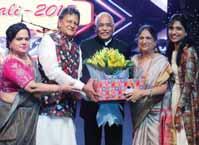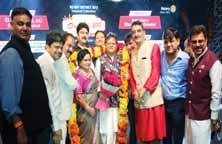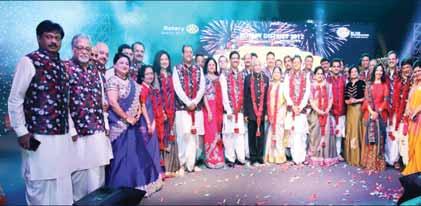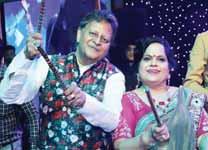












































12 An RI President comes calling… to Chandigarh
RI President Barry Rassin and Esther’s visit to various service projects in Chandigarh.
20 Rotary is my stress buster: Sushil Gupta
Five Rotary districts felicitate RIPN Sushil Gupta in Kolkata.
26 Coffee with Sushil
Rapid fire questions from PRID Shekhar Mehta to RIPN Sushil Gupta, PRIP
Kalyan Banerjee, RIDEs Bharat Pandya and Kamal Sanghvi.
34 I haven’t done anything great: Ravi Shankar
D 3190 DG Suresh Hari and Anita chat with Ravi Shankar and Paola at the Chennai Institute.
56 Partner Power at the Chennai Institute
An orientation programme for the spouses of incoming district governors at the Chennai Zone Institute.
60 For a Polio-free world Districts across India celebrate World Polio Day.
62 Naropa Festival in Leh
Join in the festivities at Leh in the Himalayas for the five-day celebrations.
70 Flitting about in a time of turmoil


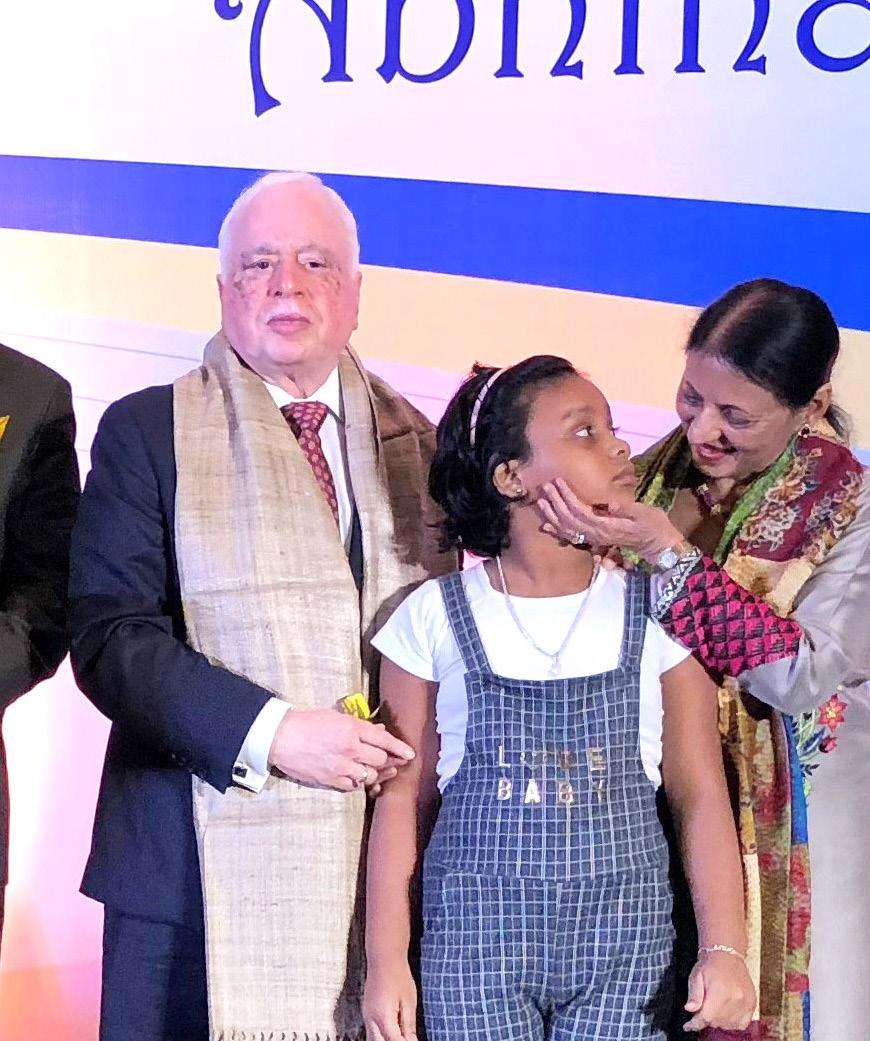

In a humorous take on Moni Mohsin’s books, Sandhya Rao sheds light on the urban elite of Pakistan 56
62
Picture by Rasheeda Bhagat 12


On the cover: RI President Barry Rassin and Esther, interacting with migrant workers’ children. Also present: D 3080 DG Praveen Goyal and Basu.

The October issue had a wonderful article Rotary swings into action to help Kerala by Jaishree who gave a full picture of flooded Kerala with supporting photos. The Editor’s Note Rotary’s humanitarian spirit to the fore in Kerala was superb. Congrats to team RNT.
Daniel Chittilappilly
RC Kaloor — D 3201
TheEditorial and its related feature Rotary swings into action to help Kerala put the spotlight on the suffering faced by Kerala and the empathy shown to them by the Rotarians. It is customary for Rotary to get actively involved in relief efforts whenever a natural calamity causes mass destruction of life and property.
Why can’t we raise funds on a global scale much before the tragedy strikes so that we can meet any eventuality with speedy action? This could be done by forming a Trust
The good, bad and ugly of Rotary
TheChennai Institute theme Passion to Serve was most appropriate as it coincided with the biggest TRF donation from India coming from D Ravi Shankar and his wife Paola. The feature Rebuilding Kerala was interesting. I am relieved to note that Rotary’s paddy project escaped the recent flood fury in Kerala. The pictures in The dazzling Chennai Nite are superb. I congratulate RIPN Sushil Gupta on his new assignment. The art of new-age parenting by Kiran Zehra is an eye-opener to parents.
RI President Barry Rassin’s speech (Be the Flamingos of Change: Barry
internationally and all the 1.2 million Rotarians contributing annually to meet the challenges of the calamities around the world. Like TRF we can have another attempt at raising funds to address natural calamities. I urge RI to consider this suggestion.
Arun Kumar Dash, RC Baripada — D 3262
Reading the article on Kerala made me more than proud to be a Rotarian. The timely leadership and service extended to the needy and suffering in the aftermath of recent floods in Kerala are noteworthy. DG E K Luke, Rtns Tina Antony, Vijayalakshmi Nair and other PDGs led from the front in the rescue mission. They not only exemplify the RI motto of Service above Self but also reinforces the role of Rotary in times of need. Their selfless act will bring in more service-minded people to Rotary.
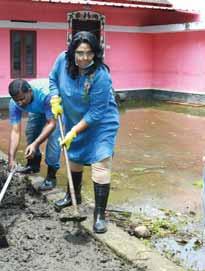
Rassin ) and the points given under headline Best and worst of Rotary are really noteworthy. Hope that suitable corrections are taken for the sake of Rotary’s future. Colourful photos in the November issue attract readers. Congrats to the Editorial team for their great job.
M T Philip
RC Trivandum Suburban — D 3211
I’vebeen reading Rotary News for the past 15 years, and been inspired by its articles and stories. But this is the first time I am writing a letter, as I wanted to respond to an article Best and worst of Rotary (Nov issue) where
Dr NRUK Kartha RC Trivandrum Suburban — D 3211
RI President Barry Rassin classified his experience with Rotary into three parts — the good, bad and ugly. The ‘good’ was Rotary’s service projects that change the world for the better. The ‘ugly’ was about an ethics issue that can only be resolved if all individuals conform to the ideals of Rotary. The ‘bad’ is what struck me the most — as I feel it can be easily resolved, with just a little awareness. “Rotaractors say that there is no Rotary club that wants them.” I cannot place enough emphasis on the potential benefits of engaging this highly enthusiastic group of young people we call Rotaractors. By closely involving
them in every project we do, we are not only creating a future dedicated group of Rotarians, but more importantly, we are shaping the youth of today by channelling their energy into social causes.
With five Rotaract clubs under our wing, many Rotaractors take part in our club activities like medical camps, tree plantations, awareness rallies, orphanage and old-age home services, etc. They attend our meetings and put forth brilliant ideas. These young people who are both dreamers and doers motivate us all to be better Rotarians.
I humbly request every Rotarian to start engaging Rotaractors in all activities of their club. It is a rich, mutually rewarding experience.
C Surendran
RC Madurai North — D 3000
Inotewith regret that in the last two years around 300,000 members have quit Rotary. The Rotarians should come out with concrete proposals and efforts to retain the existing members and to increase the number of members in the best interest of the organisation. This will also help in serving the needy people who are in distress. The LBW article (A silly game of putting a stationary ball into a hole) by TCA Srinivasa Raghavan made me smile for a while.
Dr D H Rama
RC Anantapur Main D 3160
Inspiring RID address
Congratulations on bringing out a multifaceted Rotary News. There is so much to read and feel good in the October issue, but what touched me most was the message by RI
Director C Basker on Strengthening Communities . I watched the video story of Chetna and the challenges she faced in setting up The Mann Deshi Mahila Sahakari Bank, one of the biggest micro credit banks in India. All Rotarians must watch this video of eight minutes to know what a determined woman can do. I remembered Mother Teresa when I watched this video. I cried with tears of joy. Thank you RID Basker for penning such a forceful story of Chetna Gala Sinha.
Robert Franklin Rego
RC Bajpe D 3181
RCMadras East has done a marvellous job of sending eight young scientist-students to NASA. Hope all these young people will become great astronauts and scientists in future. Their spirit must be encouraged by making them Interactors in schools and Rotaractors when they go to college. RCME can convert them as good Rotarians in the days-to-come.
S Mohan
RC of Madurai West — D 3000
A jewel in the crown
Thisletter is a token of appreciation for publishing such a wonderful magazine every month. I have been constantly reading it and it gives me immense pleasure to tell you that you have been doing a magnificent work, and the effort put in is visible.
Through the magazine we look in awe at all the good work Rotary is doing around the world, thus benefitting thousands of people through its various projects. We appreciate the excellent work done by you and your team to take this publication to
a commendable height. My compliments to you for making Rotary News a jewel in the crown.
Krunal Mehta
RC Surat West – D 3060
Rotary can forge better Indo-Pak ties
Foundation Trustee Chair Ron Burton, in his message, said Rotary has trained over 1,000 peace scholars in its six Peace Centres, all experts in conflict resolution. So why can’t Rotary help resolve conflict between nations? We the Rotarians of India and Pakistan are very cordial when we meet at Rotary events. But for seven decades we have remained mute spectators as Indo-Pak relations have deteriorated.
There should be some agency acceptable to both the countries to make them sit across the discussion table and resume peace talks. Rotary has the capacity to become one and start a global movement for peace.
Ramakrishna K RC Puttur D 3181
As Rotary News starts to print in Tamil, as requested by the 2017–18 DGs of RI Districts 2981, 2982, 3000, 3202, 3212 and 3231, all members in these districts will get the magazine in Tamil.
Those who need the copy in English can send a request to rotarynews@rosaonline.org, along with your Member ID and postal address with Pincode.
We welcome your feedback. Write to the Editor: rotarynews@rosaonline.org; rushbhagat@gmail.com
RI Dist 2981 DG S Piraiyon
RI Dist 2982 DG Nirmal Prakash A
RI Dist 3000 DG RVN Kannan
RI Dist 3011 DG Vinay Bhatia
RI Dist 3012 DG Subhash Jain
RI Dist 3020 DG Guddati Viswanadh
RI Dist 3030 DG Rajiv Sharma
RI Dist 3040 DG Gustad Anklesaria
RI Dist 3053 DG Priyesh Bhandari
RI Dist 3054 DG Neeraj Sogani
RI Dist 3060 DG Pinky Patel
RI Dist 3070 DG Barjesh Singhal
RI Dist 3080 DG Praveen Chander Goyal
RI Dist 3090 DG Dr Vishwa Bandhu Dixit
RI Dist 3100 DG Deepak Jain
RI Dist 3110 DG Arun Kumar Jain
RI Dist 3120 DG Stuti Agrawal
RI Dist 3131 DG Dr Shailesh Palekar
RI Dist 3132 DG Vishnu S Mondhe
RI Dist 3141 DG Shashi Sharma
RI Dist 3142 DG Dr Ashes Ganguly
RI Dist 3150 DG Ramesh Vangala
RI Dist 3160 DG Konidala Muni Girish
RI Dist 3170 DG Ravikiran Janradan Kulkarni
RI Dist 3181 DG Rohinath P
RI Dist 3182 DG Abhinandan A Shetty
RI Dist 3190 DG Suresh Hari S
RI Dist 3201 DG A Venkatachalapathy
RI Dist 3202 DG Dr E K Ummer
RI Dist 3211 DG E K Luke
RI Dist 3212 DG K Raja Gopalan
RI Dist 3231 DG C R Chandra Bob
RI Dist 3232 DG Babu Peram
RI Dist 3240 DG Dr Sayantan Gupta
RI Dist 3250 DG Kumar Prasad Sinha
RI Dist 3261 DG Nikhilesh M Trivedi
RI Dist 3262 DG Bhabani Prasad Chowdhury
RI Dist 3291 DG Mukul Sinha
Printed by P T Prabhakar at Rasi Graphics Pvt Ltd, 40, Peters Road, Royapettah, Chennai - 600 014, India, and published by P T Prabhakar on behalf of Rotary News Trust from Dugar Towers, 3rd Flr, 34, Marshalls Road, Egmore, Chennai 600 008. Editor: Rasheeda Bhagat.
Board
PRIP Rajendra K Saboo RI Dist 3080
PRIP Kalyan Banerjee RI Dist 3060
RIPN Sushil Gupta RI Dist 3011
PRID Sudarshan Agarwal RI Dist 3011
PRID Panduranga Setty RI Dist 3190
PRID Ashok Mahajan RI Dist 3141
PRID Yash Pal Das RI Dist 3080
PRID Shekhar Mehta RI Dist 3291
PRID P T Prabhakar RI Dist 3232
PRID Dr Manoj D Desai RI Dist 3060
RID C Basker RI Dist 3000
TRF Trustee Gulam A Vahanvaty RI Dist 3141
RIDE Dr Bharat Pandya RI Dist 3141
RIDE Kamal Sanghvi RI Dist 3250
Executive Committee Members (2018–19)
DG Rajiv Sharma RI Dist 3030
Chair – Governors Council
DG Pinky Patel RI Dist 3060
Secretary – Governors Council
DG Subhash Jain RI Dist 3012
Secretary – Executive Committee
DG A Venkatachalapathy RI Dist 3201
Treasurer – Executive Committee
DG Shashi Sharma RI Dist 3141
Member – Advisory Committee
3rd Floor, Dugar Towers, 34 Marshalls Road, Egmore Chennai 600 008, India. Phone : 044 42145666
e-mail: rotarynews@rosaonline.org Website : www.rotarynewsonline.org
The views expressed by contributors are not necessarily those of the Editor orTrustees of Rotary NewsTrust (RNT) or Rotary International (RI). No liability can be accepted for any loss arising from editorial or advertisement content. Contributions – original content – are welcome but the Editor reserves the right to edit for clarity or length. Content can be reproduced, but with permission from RNT

s you can see from the Letters column this month, one point made by RI President Barry Rassin at the Chennai Institute that has resonated with many readers is his response to the question raised by Past RI President K R Ravindran on what he found “the best and worst” in Rotary. Breaking down his answer into three parts — the good, the bad and the ugly — Rassin said the good was easy to spell out. The wonderful projects that Rotarians did across the world to change the lives of people. The bad was Rotaractors telling him that no Rotary club wanted them!
But it was as he described the “worst” or the “ugly” part of Rotary that the RI President revealed his anguish. The aspect of Rotary “that hurts me the most and keeps me up at night”, has to do with ethics. With complaints that needed investigation pertaining to money that had been given for projects either being “siphoned away by individuals or not getting to the project. We have to ensure that there is adequate punishment for such people,” he said.
Another troubling aspect was election complaints over which several hours had to be spent because “someone was unhappy he didn’t get elected”. Elsewhere, addressing another meeting during his visit to this region, Rassin recalled how Rotary had taught him to accept defeat, along with victory. He said he too had lost an important election; this hurt of course, but then he took a deep breath, accepted that the better person had won, and then reached out to congratulate that person.
The point to remember is that Rotary International’s top leader was standing in this zone and making these important points. And in the last couple
of years, this is not the first time I have seen such concerns being raised by senior leaders. Their methods of expression, their tones and body language may vary, but the message is the same. Election disputes and corruption in executing projects are the worst things that plague Rotary in our zones. Over the last four years I have heard successive RI Presidents — from K R Ravindran, John Germ, Ian Riseley and now Barry Rassin — raising the same concerns. RIPN Sushil Gupta, when he was TRF Trustee (till June 30, 2018), and now Trustee Gulam Vahanvaty, as also RI Director C Basker, are raising the same concerns from different platforms. Add to this the shameful practice of phantom clubs, and members joining wholesale and leaving wholesale, and the image of Rotary in our zones, particularly India, gets sullied. Fortunately, as these senior leaders point out, the number of Rotarians indulging in such disgraceful practices is minuscule.
Every Rotarian who wears his/her pin with pride needs to introspect why the Rotarians in this region, who work so hard to change the lives of the less fortunate around them, allow their image to get tarnished because of a few black sheep. As President Rassin concluded, “clearly in some places we are not functioning in accordance with the ethics of Rotary”.
At a time when Rtn D Ravi Shankar from Bengaluru has raised our tiranga high by his stunning gift of `100 crore (over $14 million) to TRF, the second highest after the Gates Foundation, and the fourth Indian will be at the helm of RI come 2020–21, India simply cannot afford to have these warts or glitches. A good gardener/planter knows the virtues of deweeding…
Rasheeda Bhagat
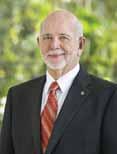
Dear fellow Rotarians,
It’s traditional that the first Rotarian magazine of the Rotary year carries a profile of the incoming RI president and his or her family. I’ve always read those profiles with interest, never giving much thought to the possibility that one day, I might be the one bringing a writer from the magazine to my Rotary club meeting! I have never liked a lot of attention, and the idea of having my picture on the magazine cover made me a bit uncomfortable. But when I saw the photo the editors chose, I smiled. Because the star of that picture definitely isn’t me, or even my wife, Esther. It’s the flock of flamingos, none of which could care less about Rotary, all strutting past us in the same direction. All of them — except one.
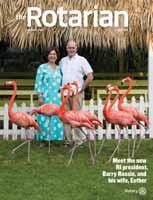
I couldn’t think of a more appropriate image to reflect the message I want to convey to Rotarians. That one flamingo, going the other way, represents so much of what we need to do in Rotary. That flamingo knows everyone’s going one way. She sees it. But she also sees that maybe the path they’re on
isn’t the best path. Maybe, just maybe, there’s a better path over there, and she wants to get a good look before she goes marching on with her friends. And if, when she does stop and look, that new path does seem better, she’ll call the rest of the crew to come over and check it out with her. And maybe, just maybe, they’ll all choose that better path together. Change is hard. And the longer we’ve been going one way, the more friends we have with us, the harder it is to be the one who turns around and does it differently. But change — not change for its own sake, but careful, considered, goal-directed change — is essential for any organisation that wants to evolve, stay relevant, and move forward in the right direction.
So take a look at that picture, but don’t look at me. I’m not the one that cover’s about. That cover is about the flamingo. It’s about having the curiosity, the courage, and the conviction to look at different paths that might be better — whether you’re out for a stroll on a beautiful Bahamas morning, or helping chart the course for our organisation.
Barry Rassin President, Rotary International

Dear Rotarians,
Health promotion and disease prevention programmes focus on keeping people healthy. “Wellness” elevates health promotion and disease prevention to a state of complete physical and mental well-being. Wellness is described as the attitude and active decision made by an individual that contribute to positive health behaviours and outcomes. According to the WHO, ‘health is not merely the absence of disease but a state of complete physical, mental and social well-being’. Health promotion is “the process of enabling people to increase control over, and to improve, their health”. Environment and right lifestyle play an important role in keeping people healthy. Tragically, one in six of all deaths worldwide are caused by pollution, and the vast majority occur in developing countries.
In December 2017 a test cricket match between Sri Lanka and India had to be stopped several times as Sri Lankan players complained of breathing difficulties while some also vomited on the ground due to “poor air quality” in Delhi. Despite being the capital of India the quality of air in Delhi is far below international standards — which unfortunately is also true of so many Indian cities. The level of pollutants in the air, including toxic gases and particulate matter, is high enough to pose health hazards, especially for persons in the vulnerable age groups — children and the elderly.
Another concern we have is the emergence of lifestyle-related diseases. Obesity is a recognised health risk in developed countries. In developing countries diabetes, another lifestyle disease, is fast emerging as a major health concern and assuming epidemic status.
Effective communication is understood and proven as a useful and cost effective tool for addressing public health problems. It is time we plan new strategies to promote wellness as a life changing philosophy. Many Rotary clubs periodically organise medical camps. In addition to these camps, Rotary clubs should also plan and promote communication strategies including public service announcements, health promotional programmes, mass media campaigns and newsletters. Let clubs motivate Rotaractors, Interactors and RCC members to spread the message amongst their communities that they can improve their health and the quality of life by making even moderate physical activity a part of their daily lives. WHO refers to “social determinants” as the economic, social, cultural and political conditions in which people are born, grow and live that affect health status. By including wellness-related health promotion and disease prevention programmes in their medical camps, clubs can also address these social determinants.
A report jointly prepared by the WHO and World Economic Forum says that India will incur an accumulated loss of several thousand billion rupees in future on account of unhealthy lifestyles and faulty diets, unless preventive steps are taken now.
It is the right time to promote wellness programmes to improve the quality of life by healthy living both physically and mentally. This will be the real service and true inspiration to the community around us. Be the Inspiration

C Basker Director, Rotary International

The one project in Chandigarh that RI President Barry Rassin showed a lot of interest in and spent some time interacting with the beneficiaries, particularly children, was a hands-on project being implemented in the poorest of poor areas of Chandigarh, a small pocket in Saketri.
Here the Rotary Club of Chandigarh, D 3080, is involved in a hands-on operation to dramatically change the lives of some 500 people living in a decrepit area with poor
year ago, the children had no opportunity to even decipher the alphabet in any script, but by the time President Rassin and Esther sat down for a performance by the children who are now being educated through special arrangement made by the Rotarians, two of the girls were able to make their first ever speech in English.
It was with a lot of pride that the RI President videographed these speeches and talked about this particular experience in other events he attended in India. Later he said: “We had the opportunity to go to this project to
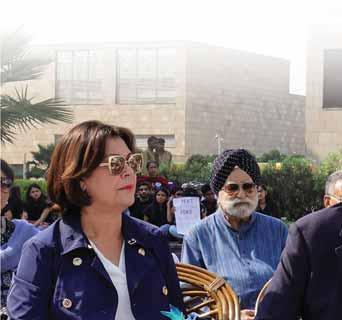
RI President Barry Rassin and Esther, PRIP Rajendra Saboo and DG Praveen C Goyal at a Peace Rally.
see how Rotary is supporting about 150 families with health and hygiene, literacy, etc. We saw a group of very disciplined students when we went to a school and it was great to meet the children and see how they are studying. Clearly, they want to get an education and they are very hardworking. I had the privilege of listening to two of the children making their first speech in English, and it was heartwarming.”
The two girls who welcomed the RI President and Esther and other Rotarians in English were of course
nervouss, fumbled a littlee, laughed a
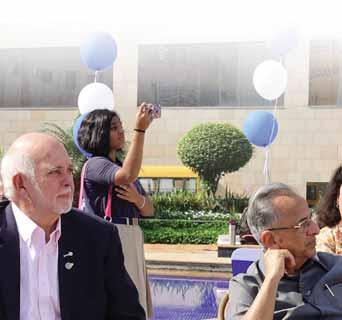

lot and made a few mistakes. But the confidence they displayed made it clear that they have begun their journey into a magic world of letters and were excited about the prospect of laying it open layer by layer.
RC Chandigarh took up this project to make a difference in the lives of this pocket of 500 totally neglected and forgotten people — most of them migrant workers and their families — at the initiative of Usha Saboo.
Accompanying her husband, PRIP Rajendra Saboo, during a bitter cold New Year’s Eve to distribute blankets to those who lived on the streets or huts, they chanced upon this colony in the Saketri region. She was particularly disturbed at the deplorable living conditions and mulled over the dismal future staring at these slum children in the face, with little or no access to any healthcare, basic hygiene and literacy.



DG Praveen Goyal and Basu light a lamp at the intercity Rotary clubs’ meet in the presence of President Rassin and Esther and PRIP Rajendra Saboo.
The club members decided that they should launch a long-term project with a holistic view to provide a bouquet of well-planned professional services from various sectors — but particularly health and education — to change the lives of these people.
PDG Madhukar Malhotra explained that the club joined hands with SEWA (Self Employed Women’s Association) to oversee the project and the Bhartiya Vidya Bhavan School, Sector 27, Chandigarh, came on board as a partner to “give us teachers
for providing education after school hours. SEWA did a malnutrition study and found the children were severely malnourished.” Its volunteers have promised to work holistically with this neglected colony and its inhabitants on health, civic amenities, empowerment, education, poverty alleviation and bring in a behavioural change among the people. SEWA’s project coordinators visit the place every day. A five-year-old project, which will be reviewed and renewed at the end of that period, “it has got great
involvement from the members of our club and gives us a sense of pride as Rotarians and is also in sync with President Barry’s slogan Be the Inspiration”, added Malhotra.
This ambitious project, which costs around $47,000 a year, is aimed at a whole range of things such as disease prevention, personal hygiene, waste disposal, special classes for school dropouts, skill-based technical training, career counselling, weight and height monitoring, balanced diet, information and awareness campaign on government schemes, developing local leadership, encouraging use of solar panels, etc.
President Rassin and Esther visited a periodic health camp where doctors and paramedics examined the patients and gave them medicines and further referrals. Hailing from the health sector, the RI President took keen interest and interacted
We saw a group of very disciplined children. I had the privilege of listening to two of the children and it was heartwarming.”
RI President Barry Rassin.


with the health professionals giving voluntary service at the venue.
President Rassin also visited the Rotary Peace Monument put up by Rotarians as Chandigarh was the second city in India to be declared Rotary Peace City in 2003; the first was Chennai. According to DG Praveen Goyal, the concept of Rotary District Peace Communities was conceived in Wagga Wagga, NSW, Australia by Rtn Tony Quinlivan, and that city became the first Peace Community in 1993. Since then, Peace Communities have been proclaimed in different parts of the globe.
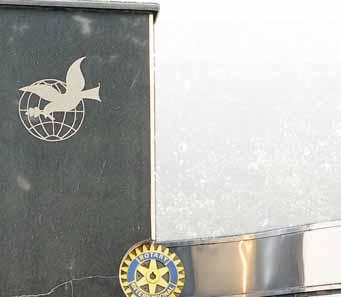
PDG Malhotra added that when Vijay Wadhawan was the president of RC Chandigarh, under the guidance of PRIP Rajendra Saboo, the club planned a Rotary Peace Monument at one of the most popular and



lush green tourist spots in the city, the Sukhna Lake. This monument has been designed by the architect couple Rtn Sandeep Luthra and his wife Suchita. The message sent out through this monument to the community is respect and dignity to everyone without discrimination or prejudice; rejection of violence, resolving conflict, freedom of expression and reconciling differences and pursuing cultural harmony and diversity.
A special dinner hosted by the Saboos
A grand dinner was hosted to mark Rotary’s First Couple’s visit to RI District 3080 by the Saboo family at the Hyatt Regency in Chandigarh, which was attended, apart from PRID Y P Das and Manju, district leaders and their spouses, by several senior bureaucrats and professionals of the

city. Some of the non-Rotarian guests included Advisor to the Administrator, Parimal Rai, who is the seniormost person in the Chandigarh administration after the Governor; Home Secretary Arun Kumar Gupta; Finance Secretary Ajoy Kumar Sinha; Chief Principal Secretary to the Punjab CM Suresh Kumar; Principal Secretary to the Punjab CM Tejvir Singh; IG Arvind Kumar from the ITBP; DG of Chandigarh Police Sanjay Bainiwal; Additional Chief Secretary to Haryana Government Vijai Vardhan; leading judges, industrialists, surgeons, and editors of newspapers.
A comprehensive WinS project done by RC Chandigarh Midtown at the Government Model School, Manimajra, that President Rassin
RI President Barry Rassin, Esther, PRIP Rajendra Saboo, Usha, DG Praveen Goyal, Basu and PDGs and spouses at the Peace Monument in Chandigarh.



visited, and spent some time in personally inspecting the quality of the toilets constructed, has an interesting history. PDG Shaju Peter explained that a conference the club had two years ago was attended by Rtn Jon Deisher from RC Alaska. “He was a regular visitor to India and was fond of attending the NID programmes in India. Kanan Diwan, the spouse of PDG Yoginder Diwan, was the President of the club, and Deisher said his club would like to participate in a joint project with our club. His only condition was that the project should be related to girls in schools and he wanted to make and distribute low-cost sanitary napkins with a technology he knew was used in Kenya,” recalls Peter.
That project didn’t come through, but Kanan mooted the idea of building separate toilet for girls in schools; Deisher came on board and a joint project to build toilets in 10 girls’ schools was conceived with a grant of $42,000. Along with toilets, handwashing stations were built too and Rassin and Esther joined the children in a music and song filled handwashing session.
The first couple also visited the blood bank run by Rotarians in Chandigarh, an iconic project in this city. DG Goyal explained that this blood bank — Rotary Blood Bank Society Resource Centre — was started when he was president of RC Chandigarh in 2000–01, in association with the Blood Bank Society, through a 3H grant. The entire project cost about `3.5 crore.
At an intercity club meet President Rassin struck a few light and emotional notes when he looked back to the “January of 1991, when I had hair on my head, my wife looked like a teenager… she still does… and we attended the International Assembly in California. We had just got married less than two months earlier so this was like a honeymoon,
and we had this awesome meeting where we met RI President Raja (Saboo) and Usha. I learnt that week what it takes to be a great President. If I could do anything as close to what this wonderful couple has done, I would feel we have succeeded. I thank you Raja, for being my mentor, my leader.”
Referring to the video played earlier by DG Goyal which listed an impressive array of projects — PRIP Saboo’s medical missions to Africa; the MoU signed with the Himachal Pradesh Government by all the Rotary clubs in the State to do a joint project on Happy Schools; providing healthy and wholesome meals to the underprivileged at `10 a meal; an eye donation project; providing umbrellas with Rotary logo to elderly cobblers sitting under the harsh sun; RC Dehradun forming 12 Interact clubs; RC Ambala Industrial
City forming a Rotaract club with all the members being visually-challenged, and many more, — Rassin expressed his utter surprise. “On seeing the video, I asked your DG that has he been doing all these projects before July 1, and he said no all of it has been done after July 1. You are doing an amazing job and you
should feel proud of all the local projects you do.”
But as an organisation Rotary should never take its eye off the big projects, one of which was to eradicate polio from the face of the earth. “From 350,000 people a year, this year we’ve had only 18 children contract the polio virus but still it’s 18 children and we must remember the promise we made to the children of the world to eliminate polio.”
Urging Rotarians to be proud of the work they do and the lives they touch and change, President Rassin related the story of how after the Haiti earthquake “we did 105 projects worth $6.5 million, with 60 countries supporting that project. That’s what Rotary can do because Rotary gets together to support a project or a community.”
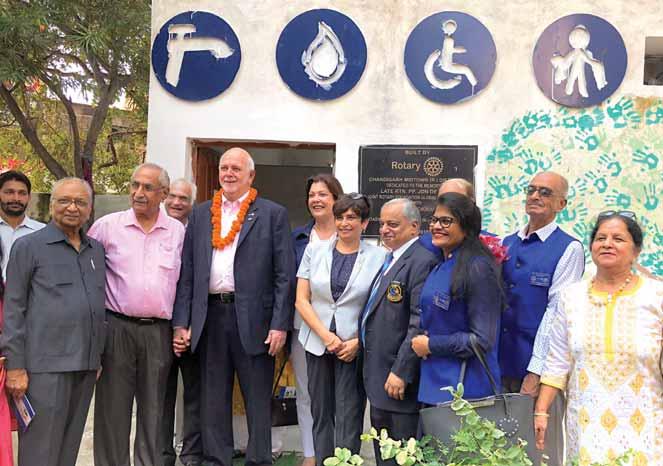

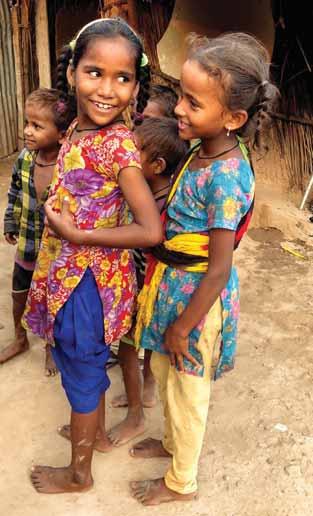
During that time, in a maternal and child health project, a group of midwives told the Rotarians that they weren’t able to help as many mothers as they’d like to in rural areas for lack of transport facilities. “So we said we’ll help you. First, we got the local Rotary club to give us $1,000. Clubs in Haiti don’t have too much money, but they knew this project was important so they gave us $1,000.” Next the clubs in his district matched the amount, and then other districts and countries — 54 different districts — came on board and a global grant of $75,000 materialised. “That’s how our Foundation works; with a $1,000 investment we were able to get a $75,000 jeep. Which investment banker can get a return like that? Our TRF can… turn $1,000 into $75,000!”
The jeep was acquired, painted with a pink Rotary wheel and given to the midwives. A couple of years later, when a team went to Haiti to inspect each and every single project, “we stopped by the midwives and they told us: ‘We believe we’ve reduced maternal and child mortality rates by 50 per cent, thanks to the jeep you gave us.’ Just think of that!”
Rassin congratulated Indian Rotarians for their numerous community welfare Children at

projects; “you have shown the fastest growth in membership, the fastest growth in Foundation-giving and I believe you can become No 1 in Foundation-giving. You have a strong Rotaract movement too.”
But, he added, “we still have weaknesses, so we have to look at ourselves very closely and ask how do we change?
How do we become a Rotary club that is more representative of what we should be, more relevant to the younger population, to the recently retired and to all races and all segments of our society? Our clubs have to ask: Are we relevant to today’s world and to all sections?”
they are hands-on Rotarians; people who have rolled up their sleeves and gone to tornados and hurricanes.
PRIP Rajendra Saboo
In his address, PRIP Rajendra Saboo said, “It is a big privilege for us to have Barry and Esther in our district, whom I call an outstanding couple, because they are hands-on Rotarians. They are the people who have rolled up their sleeves and gone to Haiti and other places, facing tornados and hurricanes, and worked there not only for rehabilitation but during relief work too.”
A replica on Rassin’s theme in rich tapestry was presented to the first couple. DG Goyal introduced members of the newly chartered all-women’s club RC Saharanpur Waves.
President Rassin attended Rotaract meeting in Chandigarh and urged both Rotarians and Rotaractors to ensure that there was a 100 per cent conversion of Rotaractors to Rotarians. If that happened everywhere, as it has happened in his home club, “we wouldn’t be worried about a declining membership and would have Rotaract clubs that would continue to feed our organisation. I tell Rotaractors and Interactors whenever I meet them that they are on the Rotary highway and they may get off at the exit when they finish their course but they can come back to the university to join a Rotaract club and then get off after university to join a community-based Rotary club. They have to keep coming back on that highway so they can continue their Rotary journey for the rest of their lives.”
Pictures by Rasheeda Bhagat
Designed by N Krishnamurthy
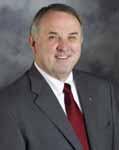
or many of us, December is a time of reflection about the year that is about to end. We think about the things we resolved to do and compare that with what we actually got done. Many times we surprise ourselves when we realise we achieved even more than we had hoped. We also start thinking about the new year and, with the best of intentions, commit ourselves to even greater accomplishments.
It is a time when our thoughts turn to the things that are important to us — and nothing is as important as family. We are grateful for those we love and for those who love us. For Rotarians, that encompasses a large number of people around the world, because our concept of family includes not only our immediate relatives but also those many friends we have made over the years sharing Rotary. Each of us is much like a stone thrown into a pond, creating many ripples. When our ripples intersect with the ripples of our family and friends, we truly have an impact on our world.
We also think about the organisations that are important to us and that exist because of our generosity as well as the generosity of others. We voluntarily support these organisations and generously contribute our time, talent and treasure to further their work and make our world a better place for all. And through this work, our family gets even larger.
Our family and our impact continue to grow each year through our commitment to and support of our Rotary Foundation. Working together creates a synergy that allows one person to truly make a difference. And when we all work together and commit ourselves to a cause, there is no limit to what we can accomplish. In that process we are bound together and become an even more close-knit family.
So at this special time of year, as you reflect on your family and the good things in your life, think about your Rotary legacy. Now is the time to make your lasting commitment so that the important work of our Foundation will continue in perpetuity.
Stefan Meuser

Hamburg has a strong tradition as a bicycle town. With its mostly flat terrain and great biking infrastructure, the city is an ideal place to explore on two wheels, and Rotarians who come for the 2019 Rotary International Convention, from June 1–5, will find a variety of ways to get rolling.
For short trips, you can pick up and drop off a StadtRAD (stadtrad.hamburg.de), or city bike, at one of 120 locations. There’s no charge for the first 30 minutes; after that, you pay 8 euro cents per minute or €12 per day. To use the StadtRAD system, you must first register online with a credit card, and you must have a mobile phone that works in Europe.
Many bike rental shops offer city sightseeing tours, as well as excursions into the countryside. Try hhcitycycles.de/en or hamburg-radtour. de (in German). For longer trips, komoot.com is an app that can help you plan your route. A popular new option is renting electric bikes, which are equipped with a small electric motor that supports pedalling.
Visitors should be aware that Hamburg cyclists ride fast and are adamant about their right of way. Pedestrians should always be alert for cyclists and make sure to keep to the right on shared sidewalks and paths. Listen for bells; if you hear one ring behind you, it probably means you’re on the wrong side!

Ron D Burton Foundation Trustee Chair
Register for the 2019 (June 1–5) Rotary Convention in Hamburg at www.riconvention.org ©The Rotarian

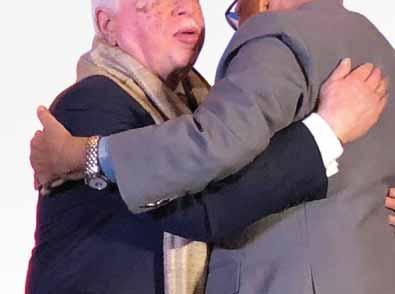
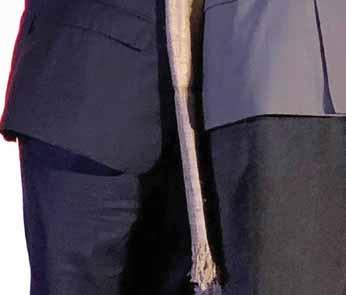












esponding to the felicitations on his nomination as RI President 2020–21 in Kolkata, RIPN Sushil Gupta said he had many precious bonds with Kolkata; “my first meeting as a Director was done here by PRID Shekhar Mehta, and I have so many friends here. But so many accolades have been given to me here that I am wondering ki meri manzil kaha hei (where is my final destination).” The event was hosted by Districts 3250, 3261, 3262, 3291 and 3292. A passionate hiker and keen mountain lover, he said while climbing a mountain one kept looking at the peak, and saying, “I have to get there, you keep climbing. With that feeling and resolve in mind, I’ll make the journey to the pinnacle of RI. But it’s not going to be an easy journey; to fill into the shoes of PRIPs Rajendra Saboo and Kalyan Banerjee is a daunting task indeed, but I am sure with god’s grace and blessings of my gurus, I will be able to meet your expectations.”
Describing Rotary “as my stress buster”, Gupta said this was his 41st year in Rotary and in this journey, “I can’t describe how much love and opportunity I’ve got to serve the community. Shekhar (Mehta), by bringing this girl child (6-year-old Barsha Pramanik), you’ve really touched my heart.” He was referring to Mehta’s statement that five heart surgeries had been done on children under the Gift of Life programme in the RIPN’s name, and Barsha was introduced to the Guptas.
He then gave an example of how Rotary works. In 2006, while he was attending the




Copenhagen Convention, his phone rang. “In Udaipur we had put up a heart camp and identified 20 patients with heart disease of which 12 children needed surgery. I asked them what next, and they said the project/camp has been completed. And I said how can it be completed; it has just started. Now the people who know they have heart disease — earlier they didn’t have a clue — will wonder at the road ahead. Whether they will be able to do the operation or not; if yes, where will they get the money from. Every day from henceforth they will die a death.”
This was how he had got involved in the Gift of Life programme which did children’s heart surgery. “Till date we’ve done over 3,000 operations with a 100 per cent success rate. That’s how Rotary should do its projects; take them to their logical conclusion.”

position”, Gupta said it was also a recognition of his values and hard work. He had entered the hotel industry “without even knowing what this industry was all about. I hadn’t even run a private company till then. But if you have the passion that I have to learn this and I will work hard to do so and will succeed; if you move forward with confidence and courage, things will fall in place.”
The values that he learnt from his parents, specially ethics, had taken him towards success. As also the support from his wife Vinita — “She is quiet, doesn’t say much or sometimes says this is too much, but when it happens, her full support is there for me… it is 100 per cent not a single per cent less.”

The fourth RI President from India will be a fine leader. His Rotary commitment and engagement are unmatched. As a host and a hotelier, his and Vinita’s hospitality is unparalleled, as is his ever-booming laughter.
Past RI President Kalyan Banerjee

Dedicating “this honour to all of you Rotarians who work so hard for Rotary and which has got me this
Addressing the meeting, Past RI President Kalyan Banerjee said: “I have been trying to get used to the wonderful idea of India having its fourth RI President standing on the threshold of taking charge.” India
provided its first president in 1962–63 when Nitish Laharry, a Rotarian from Kolkata, was chosen. “In those days, presidents were chosen at the convention and at the 1960–61 convention, senior Rotarians just came to him and said, ‘Nitish, we want you to be the

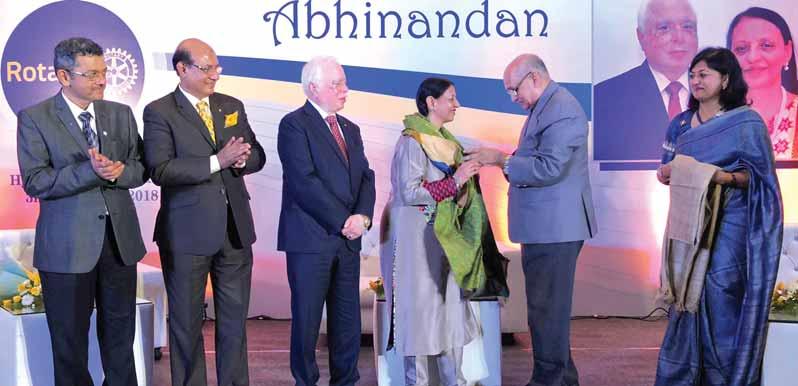


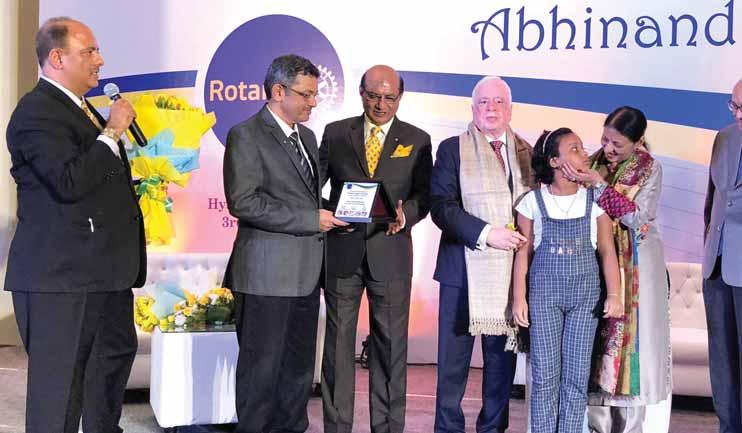
Rotary President’, and there he was. And his outstanding theme is still quoted often: Kindle the spark within.”
The second Indian president came in 1991–92, 30 years later. “Rajendra Saboo, known to the Rotary world as Raja, also Kolkata-born, came in to lead us and he left a huge mark, both with his theme of Look beyond Yourself, as also his leadership. Twenty years later, I followed my leader. I too, was Kolkata-born, and everyone said that to be an RI President, you need to have a Kolkata connection!”
But in Rotary, you can always expect the unexpected, and Sushil Gupta, born in Punjab had now been chosen, but his wife “Vinita was born in Kolkata. He will take over, only 8 years later, after me. So you can see that we are moving on to fast forward now — first 29 years, then, 20
years, now 8 years. And perhaps, the next leader from India will come in 5 or 6 years. And we could well be going back to our Kolkata connection again!” After all, Rotary came to India in 1919 in this city, he added.
Touching upon the “solid Rotary background” of Gupta, Banerjee described him as the “Polio eradication pioneer of India. We had worked together on polio in the late 1980s and ’90s to make it happen. He has pioneered Rotary’s exciting journey into providing clean, safe water to the countries of the world.”
Also, Rotarians should know that Gupta had helped to conceptualise RAGS — Rotary Action Groups. And whether it was getting to work with corporates through CSR, or TRF Stewardship …. “Gupta has always been in the thick of it.”
Banerjee disclosed that when Gupta said “he wanted to be in the thick of not only small initiatives but Rotary International itself, we all said, ‘come on Sushil — that’s the way to go.’ The Nomination Committee for President in Rotary is a unique committee. It has elected representatives, all past directors, from 17 of the 34 zones worldwide, and these are all seasoned, experienced Rotarians. And Sushil had a competitive field from both the Americas and Europe as well.”
Banerjee described the sleepless hours he had spent on the night (in India) of reckoning and after exchanging many phone calls with Gupta, he finally got a call from PRID Shekhar Mehta, a member of the nominating committee, telling him that Gupta had made it.

He then added: “I know that the fourth RI President from India will be a fine leader. His Rotary commitment and engagement are unmatched. And as a host, and a hotelier, his and Vinita’s hospitality is unparalleled, as is his ever-booming laughter. May he keep laughing and setting new benchmarks, along with Vinita, who is a very special human being. She will add so much to Sushil’s presidency as the first lady of Rotary. And we thank her for her Kolkata connection!”
Banerjee then told Gupta, as he gets ready and plans his year, to keep in mind that “Abhi toh asli manzil pana baqi hai /Abhi toh irado ka imtihan baki hai. /Abhi toh toli hai mutthi bhar zamin. /Abhi tolna aasman baki hai. So, Sushil, plan and work and lead so that you can outdo, outshine and better all of us before you.”
Past RI Director and Convener of the meet Shekhar Mehta said he was really happy because his two mentors in Rotary, Kalyan Banerjee and Sushil Gupta were present in the hall. “The first big event I did even before I could become a Governor was with Banerjee and the first big assignment I got, was because of Gupta, who recommended my name as a training leader, and has mentored me after that at every stage.”
He said that as the two Indian members of the nominating committee, he and PRID Manoj Desai “went on to do our task in accordance with the Manual of Procedure (MoP) which says you have to choose the best man for the job. I assure you we did just that… we selected him not because he is an Indian but because we followed the MoP in letter and spirit. He was miles ahead in experience and the variety of work he has done, having served on some 20 or 25 RI committees, and on half of which he was either the chair or the vice chair!”
Mehta then added, “With all due respect, the others, all excellent Rotarians of course, did not match his experience or work.”
Congratulating Gupta on his nomination, RIDE Bharat Pandya said those who have made a mark on the history of the world are “people who rose to positions of leadership and influence through sheer force of determination,
He has served on some 20 or 25 RI committees; on half of which he was either the chair or the vice chair!
Past RI Director Shekhar Mehta
It’s not going to be an easy journey; to fill into the shoes of PRIPs Rajendra Saboo and Kalyan Banerjee is a daunting task indeed.
RI President Nominee
Sushil Gupta
self-confidence, hard work and perseverance. Gupta is one of them.”
Recalling his nearly 20-year-old association with Gupta, Pandya said he had first met him as “the RPIC at our district conference where I made a presentation on the GSE team and at the end he shook my hand and said ‘well done’. Some years later he became RI Director and I became DG nominee. As DG, one of my focus areas was water conservation and management, and of course one of my inspirations was the great work Sushil Gupta had done in this area.”
Later both of them served on a membership committee; “it was my first experience on an RI Committee and he held my hand and guided me on how best to function in an RI committee”.
Over the years, he had learnt that one of Gupta’s strongest quality is “his organisational skills. Whether it was organising Rotary Institutes at Mumbai and Kolkata which I attended, or water summits or Presidential conferences, he brought his tremendous organisational skills to the fore. Because he firmly believes that success in any organisation is not an accident but always a result of commitment to excellence, intelligent planning and proper execution. And that is what he does in whatever he undertakes. I have identified
three Cs in Gupta: commitment, confidence and competence.”
He was committed to any task he took up; competent in everything he did, whether business, Pranic healing, water conservation, the Himalayan Trust or Rotary.
Gupta also had a focused approach; “he brings focus and concentration to any task he undertakes. Focus has tremendous power; the sun is a powerful source of energy and every hour the sun bathes the earth with billions of kilowatts of energy but with a hat and a sunscreen you can bathe in the sun for hours on end without any ill effects.”
The laser, on the other hand, was a very weak source of energy, but it takes only a few kilowatts of energy, focuses it into a coherent stream of light and using a laser you can cure a cancer, cut glass and drill a hole in a diamond, the toughest substance known to mankind. “Focus has tremendous power and that’s what Gupta brings to whatever he does,” Pandya added.
One of Gupta’s most endearing qualities was his “caring nature and generosity”, which Pandya said he discovered recently when his wife Madhavi had fractured her shoulder in an accident. In April 2018, during a felicitation meet for the two incoming Directors, Gupta noticed Madhavi’s discomfort and offered to do some Pranic healing. But for lack of time it didn’t happen. But later, at the Toronto Convention in June, he recalled his

promise and did Pranic healing on Madhavi. “She is in less pain and has more mobility; but most important is this showed his caring nature. Kamal and I will be fortunate to work with Gupta, when we will be serving on the RI Board as Directors and he will be at the helm of RI (in 2020–21).”
Recalling PRIP Kalyan Banerjee’s statement that in 2011–12 when he was RI President and Y P Das and Shekhar Mehta were RI Directors, the other Directors used to call them the ‘Indian mafia’. “I can safely say that with Gupta at the helm, we will not be the Indian mafia but the Indian troika! We assure you that in 2020–21 we will do our best to see that the flags of India and our zones fly high in RI so that you can lift your head with pride and say that as an Indian president, Indian Rotary is right up there!”
get only 85 per cent, but yet I got dinner in that grand hotel.”
Later, when he joined Rotary, RIPN Gupta was one of his role models and he tried to emulate him in all kinds of different ways, including wearing smart suits! “When I became a DGE and went to Delhi for training for GETS, I realised the headmaster in the school in which I was getting admitted was Sushil Gupta (Gupta was RI Director from 2003–05) and now when I am going to be a Director, the college in which I am entering, the lecturer is Gupta. (Gupta will be RI President in 2020–21 when Sanghvi will be serving his second year as Director).”
I can safely say that with Gupta at the helm, we will not be the Indian mafia but the Indian troika!
RI Director Elect Bharat Pandya
Welcoming the gathering, Convener of Abhinandan, RIDE Kamal Sanghvi, said he remembered vividly looking with awe at the glittering and brand new Hyatt Regency in Delhi (Gupta’s first hotel) and asking his dad for a meal there. “And my dad said get 90 per cent marks and you will get your dinner. I worked hard but managed to
Chairman of the event PDG Sanjay Khemka said he had taken a lot of effort to get Gupta’s guru Swami Nilanjan Saraswati to the event to bless the RIPN. “We wanted to surprise you; he had agreed, but at the last minute we got a message that he is not keeping well.”
Gupta’s response: “If you had managed to get Swamiji here, mere liye toh Diwali aaj hi ho jaati! (My Diwali would have been today itself, a week earlier).
Pictures by Rasheeda Bhagat Designed by Krishnapratheesh S
Onthe sideslines of the Rotary Zone Institute in Chennai, RI District 3232 organised a Leaders meet Leader programme, where the serving, incoming and past DRRs had an exclusive meeting with RI President Barry Rassin and RI Director C Basker. Institute Chair PDG ISAK Nazar was also present, along with RI Rotaract and Interact Committee member Karthik Kittu, DRR Girish Valsala, DRCC Solomon Victor and Rtn Ramkumar Raju. Forty delegates from 22 districts of South Asia participated in the meet.
President Rassin appreciated the interactive audience and enlightened them about his vision for promoting the Rotaract programme. He congratulated the delegates who were chosen to attend the RI Assembly to be held in January in San Diego and also extended a

warm welcome to all the Rotaractors to attend the RI Convention in Hamburg. He observed that while Rotaractors are considered the future of Rotary, only four per cent Rotaractors step up to become Rotarians. To inspire more Rotaractors to join Rotary 60 Rotaractors from across the world will be present at the Assembly and they will be part of a breakout session.
Director Basker called upon the delegates to make the Rotaract movement stronger in India and urged the DRRs the importance of registering Rotaract clubs on rotary.org and submitting reports to Rotaract News.

Kittu energised the gathering by stating that Rotaract is similar to an MBA programme and is Rotary’s life insurance. The open house attracted several suggestions and opinions. IPDRR Om Chawla suggested the MDIOs could work closely with RI committee as a sub-committee.
Later, DRR Anmol Singhal suggested that DRRs be allowed to co-sign the charter form of a Rotaract club to keep them better informed.
PDRR Subhadra Marimuthu concluded the session and asked President Rassin to share his
experience as RI President, including the time between his nomination and the day he assumed office.
Rassin was happy to answer all the queries raised and acknowledged the feasible proposals suggested by the Rotaract leaders such as enhancing the Rotary website, project funding, etc. He also emphasised the importance of the transition process — from Interact to Rotaract to Rotary and wished every Rotaract member becomes a Rotarian at the end of their Rotaract term.
The writer is District Rotaract Representative, D 3011.
RI President Barry Rassin and RID C Basker with DRRs and Rotaract officials at the Institute.




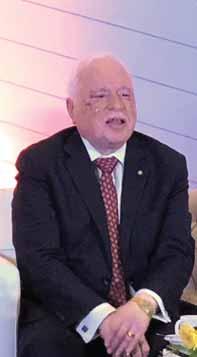
In a tete-e-tete with RIPN Sushil Gupta and Vinita, PRID Shekhar Mehta fired a series of questions to the couple, as well as PRIP Kalyan Banerjee and the two incoming Directors Bharat Pandya and Kamal Sanghvi.
Shekhar Mehta: Your feelings when you came to know you’ve been nominated RI President for 2020–21?
Sushil Gupta: I sent the first message saying ‘Guru has showered his blessings’ to Vinita and my son-inlaw. Vinita responded with: ‘Oh my god!’
SM: In your interview (with the Nominating committee) you had spelt out your broad vision on eliminating polio from the world, on working with Pakistan PM Imran Khan, and other important issues. Can you share that with us?
SG: My broad vision? There is scope to bring down the average age in Rotary and correct the gender imbalance. We have only 20–22 per cent women… women do take their time to decide whether they want to join
Rotary or not, but once they decide, they are far more committed than men. They can contribute a lot to Rotary. We also need the millennials, who have extra time and money to increase our membership.
Coming to polio, since the day I got nominated, it’s in my mind 24x7 what more can we do to complete the task of eradicating polio from the world. Imran Khan is not a typical politician and we have to make him get really involved in this task.
I also mentioned that CNBC had rated Rotary as one of the 10 organisations that are changing the world and my dream is Rotary should be considered the most preferred partner in the world. As a single person you can only do so much, but when we join hands, we can truly change the world. I mentioned all this!
SM (To Kalyan Banerjee) You’ve been like an elder brother to him. What is the quality in Gupta that you admire the most?
KB: What I admire the most in him is that he immerses himself totally in whatever he is doing. There are too many of us Rotarians who talk big

but do little. He is one who talks less but does lots. That kind of leader is what our organisation needs.
SM: You are a man with the Midas’ touch, have one of the best hotels in the world, you are passionate about the environment, healing, Himalayas, water conservation… and on top of that there is golf. How do you do justice to all these; what is your typical day like?
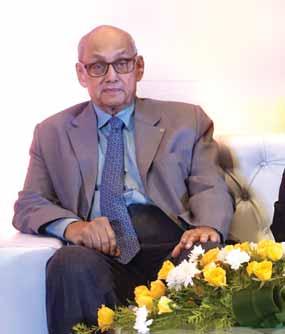
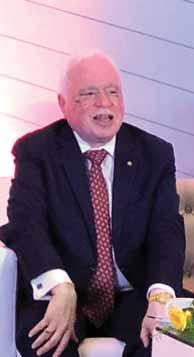
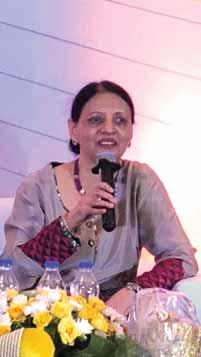
SG: (Laughs) Rotary is my stress buster.
Vinita (intervening) I’ve told him baki sab chhod do… (leave everything else!)
SG: I get up at 4.45 am, do yoga and then go for golf. For 35 years I’ve been doing yoga, much before Baba Ramdev came on the scene! On return from golf, I have breakfast and go to
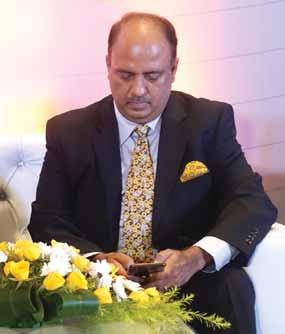


my office. I’ve never allocated time for anything. Whatever comes before me, I take it on and give it my time and attention. I have no time allocation, and believe ki ho jayega (It will be done). But the one thing you must have, is the capacity to bounce back. Everybody gets adversities and difficulties. Whatever you want to achieve, you can, if you have the capacity to bounce back.
SM: RIDE Kamal Sanghvi, what do you feel is Gupta’s outstanding quality for which you’d like to work with him?
KS: What I admire most about this extraordinary human being is the belief he has in people, the tremendous trust he has that Rotarians can deliver; he gives the opportunity and creates a path for every Rotarian to excel and join any project.
SM: RIDE Bharat Pandya?
BP: He is very passionate and brings both passion and excellence to whatever he is doing. As Kamal said, he gives a lot of opportunities to Rotarians but then he also encourages them
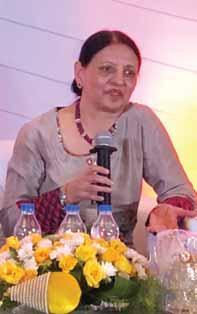
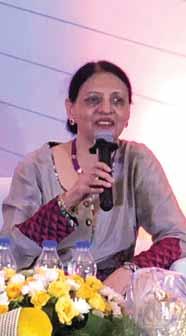
to deliver. It is his encouragement which makes all the difference.
SM: PDG Ramesh Aggarwal, you’ve worked a lot with Gupta, what inspires you when you work with him?
RA: He never loses hope; when we were working on WinS, I’d often get frustrated and say ki Governor jawab nahi de raha (the Governor is not responding), and he’d say: ‘Ramesh keep patience, the programme will be successful.’ He walks the talk; he will never tell you to do something that he will not do himself. And he always recognises people who perform.
SM: What about you, PDG Aziz Memon (from Pakistan)?
AM: I’ve worked with him very closely for a long time and I endorse whatever has been said here; He is a doer, when I called to congratulate him when we got the news of his nomination, he said, “Aziz, I want a polio-free world” and this dialogue continued. We were on the same flight from Delhi to Kolkata and for two hours he continued to talk

about what to do in Pakistan and Afghanistan to make the world poliofree! His persuasion and out-of-box thinking are really great.
SM: Vinita, what do you like the best about Rotary?
Vinita: There are a lot of good things in Rotary but the best one I like is that you make friends all over the world. For example, when he was a Governor, we became friends with the DG from Karachi and his wife. He has passed away, but his wife and I still keep talking. So many years have gone by but that friendship remains. Thanks to the troubled relations between Pakistan and India we are not able to meet but she always calls me on Diwali, and I have such friends all over the world.
SM: PDG Kalpana Khound, would you like to ask the RIPN a question?
KK: Not too many Rotarians know this, but Gupta has been to one of the most remote parts of India in Arunachal Pradesh, where we had a medical camp. It was a very difficult terrain; and he came using all modes of transport, including a boat. What prompted you to go there… many
people don’t travel to the North East, leave alone remote areas.
SG: My heart bleeds for the North East and its tribal areas. I believe that we have short-changed them and not ensured development for those areas. If I get any opportunity, I want to go there and serve those people.
SM: Your love for the North East is reciprocated by D 3240; we had to stop their registrations for this evening’s event. We expected 20 and they crossed 65! You are a food connoisseur; what is your favourite cuisine?
SG: I love good food, it doesn’t show on me much because I also try to control myself! I love Indian food and there is no match to it. One of the things on my agenda is to promote Indian food throughout the world. I also like Italian food, I can’t eat bland food, I am very choosy.
SM: What is going to be the theme of your year?
SG: It is work in progress and will continue till Jan 2020! (When the incoming President’s theme is unveiled at the International Assembly). But one thing I can tell
you is that it will have some spiritual connotation.
SM: Why don’t you dye your hair?
SG (with a hearty laugh) I retain jo bhagwan ne diya hei!
SM: You favourite destination?
SG: Himalayas.
SM: Your favourite heroine?
SG: She is seated next to me! I see very few movies.
SM: Role model or models in Rotary?
SG: I can’t single out one… but Kalyan (Banerjee) and I are great friends. I love, support and admire his work… because whatever he does, dil se kartey hei, dum se kartey hei (does it with his heart and with all his might). I’ll say only that.
SM: Vinita, your favourite food?
Vinita: I’ll tell you, but it doesn’t mean that you keep feeding me that all the time! But I love Idli and Dosai!
SM: Favourite hero?
Vinita: Only one?
SM: Your favourite destination?
Vinita: Mumbai.
SM: Finally, as RIPN what is your message for Rotarians in India?
SG: I have only one message: whatever you do, do it with your heart and take it to its logical conclusion. You may do only one project, but do it well.
Pictures by Rasheeda Bhagat Designed by Krishnapratheesh S


I/We Rtn.......................... of Rotary Club of ......................... .................................... District ............................... confirm
my/our pledge to donate homes costing Rs.3,50,000/each to a deserving family affected by the recent floods as our contribution to helping them rebuild their lives by providing them a roof to live under.
On receiving details relating to the beneficiary, we shall transfer an amount of Rs........................... (towards the cost of building the shelter) to the following bank account:
Trust Account NameRotary Kerala Disaster Relief Fund
BankState Bank of India
Branch Kaloor Deshabhimani Junction, Kaloor, Ernakulam, Kerala
Account No.37991066583
IFSC CodeSBIN0070327
Let us ‘Be the Inspiration’ to rebuild the lives of our brothers and sisters who have lost their homes! Let us rekindle Hope!
Yours sincerely, Signature
Name: Mobile:
Date: Email ID: Rotary Club of .........................
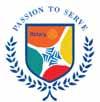
An interesting session at the Institute was one in which Past RI President Rajendra Saboo pitched questions regarding the classification system, flexibility, Rotary’s public image, weak clubs, etc to RI Director C Basker and incoming Directors Bharat Pandya and Kamal Sanghvi.
Asked by PRIP Saboo if Rotary should retain the classification system, as there is opinion in some circles that it should be done away with, RIDE Pandya said the one thing that clearly distinguishes Rotary from other organisations is classification. “It gives us diversity; as President Barry mentioned, of our five core values, the least strong is diversity.”
Declaring classification as “absolutely necessary”, he added, “When we joined, probably this was a hindrance to getting new members, but now with an explosion of classifications and the way
professions and vocations are developing, it isn’t so.” Rotarians should use the new professions to get more diversity in membership. Coming to flexibility, he said perhaps “we have misunderstood the concept of flexibility. It doesn’t mean the club can do whatever it wants. Classification is linked to flexibility.”
When the CoL allowed flexibility, Pandya said, “I believe the delegates had in mind giving the club an option to adopt systems and processes that meet its need. But what works in the US or Germany won’t work in India or New Zealand. Our classification is at the core but flexibility doesn’t mean the club can have two meetings in one day and be done with it. This is what senior leaders need to explain to the clubs.”
Saboo then asked the panellists what they planned to do at the 2019 CoL about the proposal to
do away with the classification system. Pandya responded that though he and Sanghvi will attend only in the capacity of observers, “I’m sure the delegates at CoL, who are senior Rotary leaders, are wise enough to know that classification is at the core of Rotary and that
we should not do away with it.”
Director Basker said that many suggestions were made even at the last CoL, “but the representatives applied their wisdom in approving a lot of matters. Classification of course in our part of the world is very important. We have to
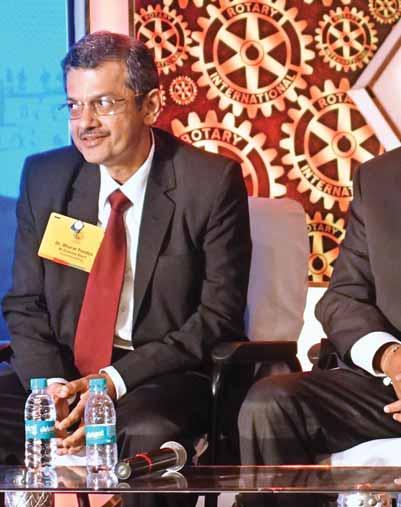
wait and see how the rest of the world looks at it; it is difficult to guess, but this will surely be an interesting debate!”
Saboo next asked Basker to evaluate the performance of Rotary clubs in our zones and if the hitherto criteria of judging a club’s performance on the basis of membership and TRF giving should continue.
Replied Basker: “I think 80 per cent of the clubs in our zones are doing quite well; the rest I consider rather weak. From last year, the criteria also include Presidential citation, the kind of projects the club is doing and the reporting of those projects. Even though both membership and TRF giving are important, those
are not the only criteria now being used to evaluate a club’s performance.”
A mechanism has been put into place to evaluate club performance and this data is shared district-wise with the DGs “so they know both the strong and weak clubs in their districts. The DGs have been asked to concentrate on the weaker clubs.”
Giving his take on the matter, RIDE Pandya said that as a visiting Rotarian, when he goes to other parts of the world and enters the meeting room, there is a “feeling of energy inside. I am not left to fend for myself and ignored once I am let inside. The meeting starts on time; the president has shared the agenda with
the secretary so there is no confusion about what is being done; a reasonable number of people attend the meeting; the speaker sticks to his time and we leave with a good feeling of getting value for our time. That club, I would say, is doing well.”
Asked how to enhance public awareness of Rotary, RIDE Sanghvi said Rotarians would have to ask themselves that since they have joined Rotary to change the world, “are we doing enough?” While some clubs did “fantastic work”, many clubs didn’t do much work “simply
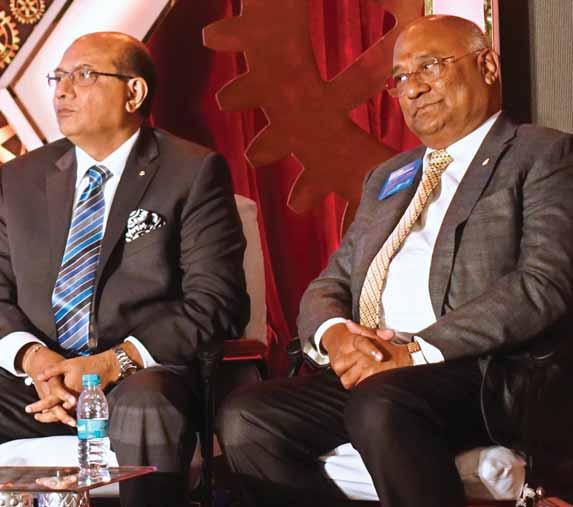
because they don’t understand their potential.”
Giving an example, he said that the average net worth of 20 Rotarians in a club, and that too on the lower side, would easily be Rs 20 crore. Such a club would have 20 CEOs or top professionals, such as industrialists, businessmen, doctors, chartered accountants, etc. “I want each of you to introspect. We have potential to do fantastic work, but I don’t think we are doing it.
Please introspect… with such potential, are we still giving only books and pencils? We need to create those schools, not just take books and pencils to them. Let’s take up large service projects. Rotary needs to
As a visiting Rotarian in the rest of the world, I feel energy inside the room.
I am not left to fend for myself and ignored. The meeting starts on time; the speaker sticks to his time and we feel we’ve got value for our time. That club is doing well.
A club with 20 Rotarians has a net worth of at least Rs 20 crores. Please introspect… with such potential, are we still giving only books and pencils? We need to create those schools, not just take books and pencils to them.
RIDE Kamal Sanghvi
change the world and we need to take a much larger responsibility in order to do so,” he said, amidst thunderous applause.
Also, he added, the media should be invited not only at installation meetings or completion of projects. “Invite or alert them earlier; tell them
we are going to operate on 10 children; come and join us. That sends a much better message and there are journalists who will join you.”
Added Pandya, “The other issue is that 70 per cent of Rotarians in our clubs are not aware what their clubs are doing; we have
to involve them. Also, as leaders we have to project an image of integrity in both thoughts and deeds in all that we do, including elections.”
On the need to divide districts, some of which were geographically becoming too arduous for the DG to manage, affecting his/ her performance, Saboo asked Basker for a solution to the resistance to such division. “This is because of emotional factors and even if a district has 130 to 140 clubs. My dream is that one day India will have 50-plus districts!”
Agreeing that such a need did exist, Basker said

Below: RIDEs Bharat Pandya and Kamal Sanghvi with Madhavi Pandya and Sonal Sanghvi.

Above: DGs Guddati Viswanadh (L) and Vishwa Bandhu Dixit (R) recognise PRIP Rajendra Saboo, RIDEs Bharat Pandya and Kamal Sanghvi, and RID C Basker with mementoes.



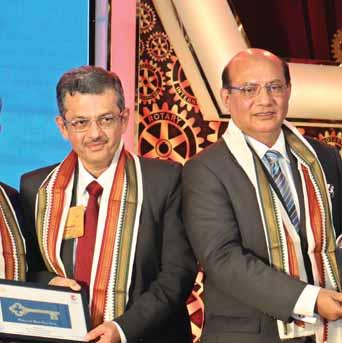
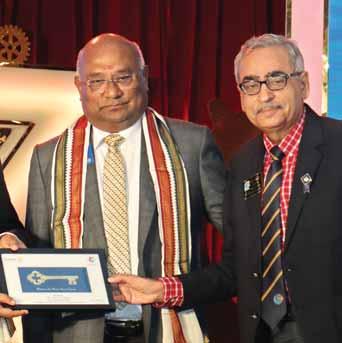

that in southern and western parts of India there is much larger membership compared to the north and the east. There was also the additional problem of different languages if a district had a large geographic area. “That is why we now need to realign our districts based on geographic and language parameters for administrative purposes.”
On the DG’s role in enhancing a club’s performance, Pandya said the weaker or developing clubs can enhance their performance only with the DG’s guidance. “It is the responsibility of district governors to identify and put a system and strategic plan in place to improve those clubs, and in this the DGs should work with the DGEs and DGNs.”
The incoming Director added that having studied

membership data for seven years “I find that 25 per cent of our clubs have less than 20 members. While I don’t say that membership is the only criteria, it is an important one. Also, about 10–12 per cent of clubs have less than five members! All of us present here (at the Institute) know why they exist and we require support and commitment from senior leaders to tackle this problem. It is very difficult to close down those clubs because there is somebody behind them. But if we can support the district leadership to close down these clubs, it will be a big benefit for Rotary in our zones.”
Agreeing with Pandya’s observation, Basker added: “It’s very difficult for the DG or RID to shut down any club as long as it is
paying the RI dues. The RI Board won’t approve such a shut down if dues are paid and most of these clubs, which have been created for other purposes, are very regular in payment of dues! So my DGs are helpless and it is very difficult for us to take this administrative decision.”
When PRIP Saboo quizzed Sanghvi on how to make a club younger in age, and if people “who are around 55 and very active should be considered a good entry point for Rotary, if they have good experience and time,” the latter responded: “I strongly believe we need a mix of both, if you bring in people with great experience and
also time to spare, you will be moving the club in the right direction. With the vigour of the young… a proposal is being pushed in the CoL that Rotaract clubs can directly become Rotary clubs — and experience of those around 55 years, Rotary will benefit.”
Sanghvi added there was a simple solution to get younger members.
“Recently at a club installation, I was floored to find that all the 40 members installed were children of Rotarians and were between 36–38 years in age! And then I realised if you can’t convince your own child to be a Rotarian, how will you convince someone else’s child to become one? This is an easy way to reduce our average age.”
Pictures by Rasheeda Bhagat

Rasheeda Bhagat
At the Chennai Institute, RC Bangalore Orchards President, D Ravi Shankar, who recently donated `100 crore to The Rotary Foundation, was the cynosure of all eyes. As most of the RI officers congratulated him and made a beeline to pose with him for pictures, Ravi Shankar brushed off the accolades and insisted he was no hero. What struck me the most was that during a nearly an hour-long chat, he mentioned the figure of `100 crore only once, and that too in passing. In a chat with D 3190 DG Suresh Hari and Anita, Ravi Shankar and Paola regaled the audience with their answers.
Excerpts:
Suresh Hari: Tell us about your school in Manipur and what takes you to the border areas?
Ravi Shankar: When I was coerced into becoming a reluctant president… I was a halfbaked Rotarian and didn’t know how to go about implementing my decision (to donate `100 crore), I thought in one year I might have to spend all of the money! I went all over the country thinking I should be able to do things myself. I didn’t have the faith to give so much money to anybody else! This took me to the border areas in the Northeast, which I found terribly neglected, I’m sorry to say, for whatever reason. These borders are porous, there is little development; they are tribals and despite all these negative points they are the purest souls I have ever seen. The children are so pure, so innocent, so untouched. Unfortunately, they don’t feel that they are Indians. They asked me are you Indian? I said you are also Indian. They gave me a look… their innocence was touching.
There I started working with a trust called Sunbird Trust run by Colonel Christopher Rego. All our growth and development should be made inclusive to ensure that the children, in all their innocence and ignorance, in
disturbed or troubled areas such as the Northeast, don’t become insurgents, militants or terrorists for lack of opportunities to come up in life. We have to make them feel they are part of us by visiting and caring for them.
SH: Aren’t you also helping a project that benefits children with HIV?
RS: Yes; It’s a very touching and disturbing issue. These innocent children in the age group 1 to 10 years, for no fault of theirs, are suffering from HIV/AIDS. I had gone to the Manipur border and saw for myself the drug trafficking and drug abuse, which is a huge problem. When the parents exchange needles, HIV is passed on and these kids are born with the gift of HIV/AIDS. Brother Ram and the Sunbird Trust take care of these kids and I’m helping them.
Anita Hari: Paola, were you very depressed when you saw these children with HIV?
Paola: On the contrary, we have to learn a lot from these children. Many of them are orphans, with no parents, or one parent, or parents incapable of taking care of them. When they saw us, they were so ecstatic; held each other and jumped for



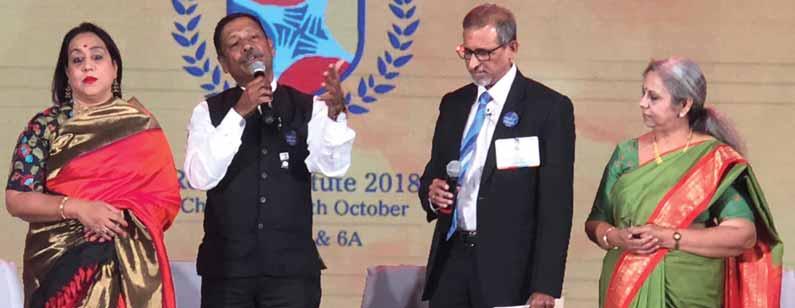
joy to express their happiness and excitement because we had come to share a few precious moments, and sing and dance with them. There are so many people in the world who have everything and yet get depressed. These children have nothing and yet they are so happy. It was wonderful to be with them.
SH: Ravi, when you were young, your sisters were very protective about you; why? And why do you want to work in cancer care?
RS: At the very thought of my sisters, I can’t stop smiling. I was born a mentally-challenged child… that’s how I felt and behaved, and am convinced I was one! We lived in a chawl, a sort of community living space for lower middle class people.
I couldn’t talk properly and saliva dripped from my mouth when I spoke. I had skin allergy and boils and because of that other kids would make fun of me. My three sisters treated me like a special kid and acted like my guardian angels; like commandos they would protect me.
After my sisters, Paola has taken that place! When I say I am an atheist, Paola jumps and says: ‘No, no, he is not an atheist, he is an agnostic. He may look bad, talk bad, do bad things but he is not an atheist!’ She even bargains with god to say that I am okay!
One of my sisters died of cancer and my mother had cancer too but recovered. I feel cancer is an epidemic and now that polio is under control, this is one area Rotary should take up.
SH: We live in a society where money and cars do matter on how you are treated. Your response.
RS: This is an outdated and overused trick to show that you are richer than the other person. I’ve seen people throw a car key and say ‘Ab bata (now show me)’; just to show that he is a bigger, more powerful man. I have never believed in expensive cars or clothes. Look at youngsters; they come with torn jeans and tee shirts, and you’ll find some heading start-ups. I’ve never seen old men having startups; because old men have no confidence. So they need Armani suits or BMW cars to show that they are somebody. The kids, the young, our leaders… we are all half-baked human beings.
RC Bangalore Orchards President D Ravi Shankar with wife Paola and PRIP K R Ravindran at the Institute. Also seen: PRID Shekhar Mehta, RIDE Kamal Sanghvi and Sonal.


SH: On giving, you have a very critical take on how people give, particularly the educated lot.
RS: The educated lot? For me they are jokers, who are often confused with the cultured lot. They think they are very smart in how to outsmart others and get mileage without really giving anything.
Our glorious country had wonderful rulers, and we gave a lot to the world but later we were ruled by a foreign country and were reduced to being beggars. That’s a cycle of life. Then we won our Independence through a powerful weapon called ahimsa, unleashed by Mahatma Gandhi. Our country has galloped ahead and today become a power to reckon with, but unfortunately, the educated are hopeless, the begging and hoarding bait has not left them. They feel insecure and don’t have the heart to give.
SH: You recently gave an interview to a radio channel in the US where you spoke about NRI giving. Tell us about that.
RS: It’s an FM channel Jazba and is meant for NRIs. He said many NRIs in the US want to serve India; how do they do it. I said whichever country you live in, whether France
Inspiration is a big word and you can’t be using it on me! What did I do?
It is like saying somebody is paying his taxes or looking after his father, so give him an award and clap for him.
D Ravi Shankar President, RC Bangalore Orchards
Rtn D Ravi Shankar and Paola being felicitated by RI President Barry Rassin, Esther and Mala Basker.

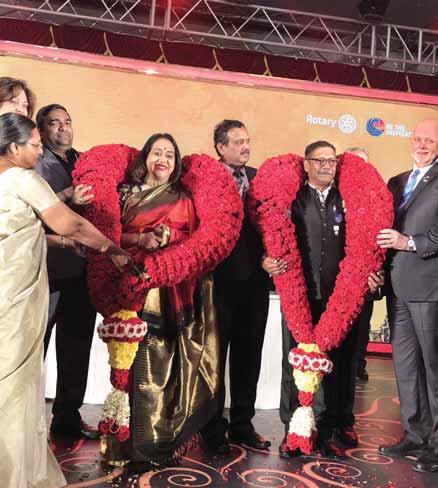
or US, be sincere to that country and follow their rules. And if you really want to serve, there is one vehicle that offers travel without petrol or visa. As RI President Barry Rassin said, Rotary is present in over 200 countries, so by joining Rotary you can help to lessen human misery from any corner of the world.
No inspiration; no miracle
SH: By your donation you have combined both this year’s theme — Be the inspiration — and the title Miracle Makers given to this batch of DGs by the RI Director.
RS: We all heard RI President Barry Rassin explain so beautifully what the logo of his theme denotes, the colours of sunset, the sea and sand
of the Bahamas. But ‘inspiration’ is a big word and you can’t be using it on me! Only when you see something extraordinary, then that word should be used. What did I do?
It is like saying somebody is paying his taxes or looking after his father, so give him an award and clap for him. I did not do anything great. I came from the street and had to build from scratch. Who helped me? No inspiration or miracle here.… When I lost my dad, society stood by me. It’s my bloody duty to see that I give back to society. It is a debt on my shoulders. If I die without doing that, I will be running away from my conscience and I will be a convict in my own eyes. I want to die like a hero with a smile on my face, because society held my hand and

Suresh Hari: About a year ago, you started talking about the various causes you’d like to support. What made you decide on TRF to entrust your money?
Ravi Shankar: I told you I am a halfbaked Rotarian, I was not aware of the structure of TRF, and as I go into it, it is opening up like Alibaba-Sindbad cave!
About 20–25 years back, I decided I have to pay back to society. Society has given me everything, it is my debt and duty to pay back. So I went around, looking for marginalised sections, tribals etc. When I was almost tired doing that, Hari asked me what I wanted. I said I want to build a cancer hospital, and schools in tribal areas in the Northeast and for the Todas in Tamilnadu, and two schools in Pakistan, just to say we are all brothers, sharing the same DNA. Just because somebody has drawn a line between us, the DNA does not disappear. My blood and their blood (in Pakistan), is the same. As people we should build bridges, and not expect the political system to do that.
Hari said ‘Ravi, there is something called TRF, and you can donate your money to them and continue year after year. You are tiring yourself roaming around like this.’ I made my decision,
and that day, after a year, I slept well and continue to do every night. Thanks to DG Hari and TRF.
SH: But thanks to you Ravi, I am not sleeping properly nowadays! What was the response from Rotary and TRF Trustee Gulam Vahanvaty and RID Basker?
RS: DG, this is the only time I won’t follow your orders! In TRF, the kind of transparency you maintain, the processes you follow, the care you take that every wish of the donor is fulfilled, impressed me. I have not seen this anywhere. Hari, for two months you kept the cheque with you without encashing it! What kind of an Indian are you? And then you said unless you are happy, we won’t take this money. I’ve seen in other NGOs, the moment you mention you want to give, they come and grab it. Gulamji, I think of him as a saint in a suit… Sufism comes naturally to him, he is such a spiritual being.
And Baskerji, as a Don, monitors everybody to ensure that nothing goes wrong. The people at the helm inspire confidence. Vahanvaty followed up the whole process. Our DG, he took me by a local bus to the airport. I had
heard some horror stories of Rotarians spending lavishly and celebrating; at one installation I saw a DG being brought on an elephant and one more DG was installed with a helicopter showering flowers. This is not serving!
Anyway, Vahanvaty came (to Bengaluru), we had a simple lunch, and over 2–3 hours, he clarified everything, point by point. I was 200 per cent satisfied and only then the cheque was deposited. This is The Rotary Foundation!
SH: You insisted on so much documentation; you made my life miserable!
RS: This giving has been done after a lot of preparation and at a time when our country is doing brilliantly well and we are no longer begging from others. Documentation is very necessary. You know the fickle mind of human beings. And there is no guarantee of life, so the will was registered, and the donation document was signed by Paola and my business partner Hari, who I consider my brother, so that it will be enforceable. I had only `10 crore with me (which he has already given), the rest is in the form of property which will be sold and the money given.
I have an appeal; when a couple gets married, for the girl the husband is the hero and she has stars in her eyes as he will take care of her, the children and the parents. But I’ve seen, even among my friends, whenever the husband decides to do something good, the wife stops him. At that time, she treats him as an idiot. My request to women is that please understand that after a person has delivered on everything, all his promises made to you, when he wants to do something for society, please don’t stop him.
SH: You mentioned the hands-on approach of Basker, he never interferes…
RS: The Don doesn’t do anything, he only watches, and delivers! (Loud applause from the audience).
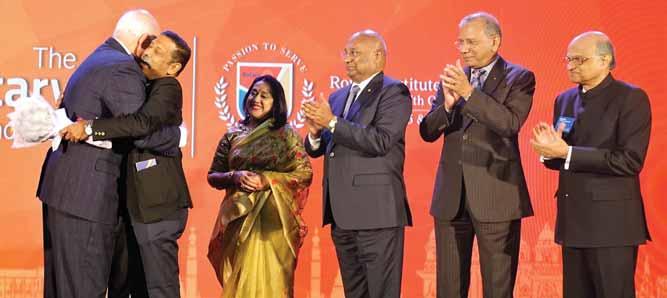
President Rassin and Ravi Shankar greet each other amidst cheers from Paola, RID C Basker, PRIP K R Ravindran and TRF Trustee Gulam Vahanvaty.
brought me so far. I am not an inspiration nor have I made any miracle.
Anita: Paola, tell us about the interesting discussion with your daughter before she went to Australia for higher studies.
Paola: A day before she left, we asked her when she’d like to come back. She said she might not return. So we said but we’ve built this beautiful home for you with so much love and someday, you and your sister should take it over. She said I might just sell this house because I don’t need it. We felt sad, having lived in the house for 30 years. So Ravi asked, ‘sell it and do what’? She said: ‘Build schools in Kashmir!’ We were taken aback. Both my daughters have their father’s genes and they too want to give back to society at an early age!
I also implore all of you to give…it may be little or small. To be honest, my husband has given away 75 or 80 per cent of
Anita Hari: Ravi, you’ve said that Paola is like a guru to you. Can you elaborate. Also, that she is a classic jewel. What do you mean by that?
RS: She is indeed a teacher to me and sometimes, without intending to, teaches me a lot. She has never asked me for anything, for riches, jewellery or luxury. Whatever she wears is artificial jewellery and she looks so beautiful. One jewellery nobody can steal from her, the best jewellery she always wears, is her smile. If that can be protected by me, I am a hero!
One occasion when she taught me… and Rasheeda Bhagat of Rotary News is a party to that. While interviewing me she asked me if I had a luxury car. I said I’m sorry I have one
and this is the last time I am buying a luxury car. That car cost me `72 lakh; with that money I could have built two schools, which for decades would have enlightened so many children. The other day, I was having breakfast with my beautiful wife… I use our SUV all the time, and she said do you remember the Benz is lying there, you don’t even look at it. I felt she was teaching something again, and that was: ‘Don’t be a fake, walk your talk.’ Without speaking a word, she taught me this lesson. (Displaying a picture on the screen) This car, which hasn’t even run 3,000 km, is a beautiful car. I want it to be auctioned and the money to be given to TRF. Rasheeda, you’ve kindled this thought in me!
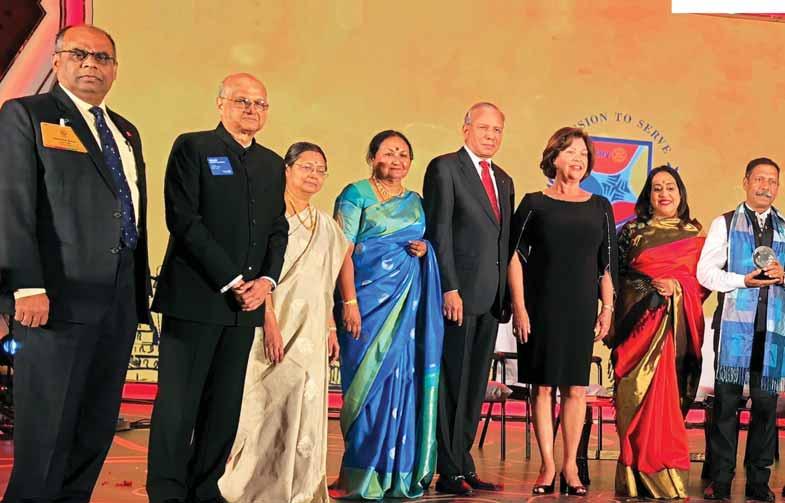
Rtn Ravi Shankar in conversation with President Rassin, DG Suresh Hari and PDG Keshav Kunwar. TRF Trustee Mike Webb is in the foreground.


his earnings; I do hope he has left something for us!
SH: As the president of your club, you’ve said it will be a year of giving back. Tell us more.
RS: We didn’t bring anything from the mother’s womb and it’s not as though all of us are great people. We won’t be allowed to take anything with us when we die. Our club, RC Bangalore Orchards, has launched three projects. One is giving back to the city. We are building a government school for 800 children, who are among the poorest. I too am a product of a government school and I was not very happy going to that government school.
Second, away from the city; we have adopted 125 schools and are calling them Rotary Happy Schools and we are going to make these

schools places where kids would want to go… want to learn and be happy there. That is giving back to society.
The third project relates to giving back to the environment. Basker appealed for help for rebuilding homes in Kerala and Karnataka, destroyed by recent floods, which is fine. But what happened in Kerala was not a natural calamity but a man-made tragedy. We cut trees for our greed; the trees hold the earth together, the roots hold the rain water and put it down to improve groundwater levels and keep the earth firm. To overcome such greed of humans, we have started a project of planting one crore saplings and 10 crore seed bombing through hillocks in the united Kolar region of Karnataka. This is a great people’s movement and the tree planting area is in two districts comprising about 13,000 sq km. This is giving back to nature.
Without nature, we cannot exist. I request all Rotarians to join us and together let us start a strong ‘giving back to nature’ movement!
SH: Ravi has committed an additional `4 crore for the tree planting project. Hats off to you; I don’t know where you get the strength to do all this.
RS: Paola and I have given a seed capital of `2.5 crore for these three projects, apart from the `100 crore donated to the Foundation and my partner/my life support system, B S N Hari has given `50 lakh. I am so proud of him.
I find that some Rotarians belong to the variety I call “cosmetic Rotarians”. They’ll go to an old-age home, give out a few chocolates, click pictures and put them on Facebook. This should not be encouraged.
SH: Can you please tell us your vision and mission in life?
RS: As I already said, I was a mentally-challenged kid and I also have a mentally-challenged dream. I don’t know how far it is achievable but nothing is impossible. I want to see in this world only two borders, that between the earth, sea and the sky, everything else, such as borders based on religion, language, caste etc, is only manmade. My dream is to have a world government where the countries become States and we all become world citizens. I believe Rotary can achieve this seamless world, where the defence budget is abolished and the huge money saved is used to eliminate human misery and poverty.
Pictures by Rasheeda Bhagat Designed by Krishnapratheesh S


(Clockwise from top) Schoolgirls from the Government Model School, Manimajra, do a Bhangra performance for the visiting RI President Barry Rassin; President Rassin, Esther and PRIP Rajendra Saboo get a demonstration on the right handwashing technique; the girls teach President Rassin a few Bhangra steps; Esther tries out a few Bhangra moves; Usha Saboo, seated between PRIP Saboo and Manju Das, greets a Rotarian’s spouse; President Rassin and Esther at the Rotary Peace Monument in the city.




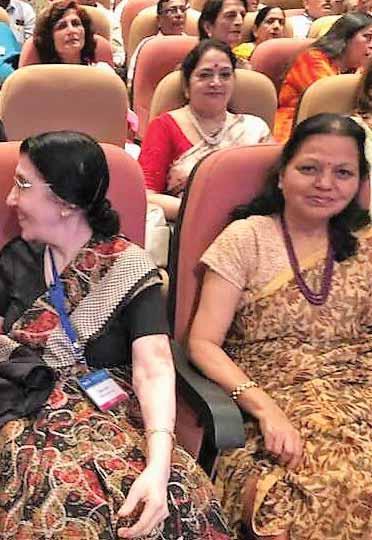
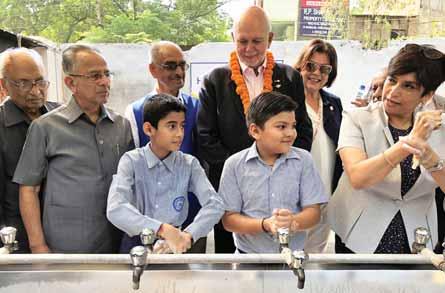

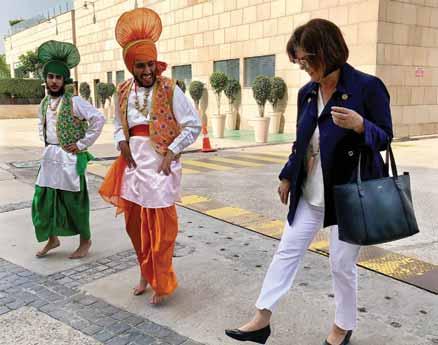

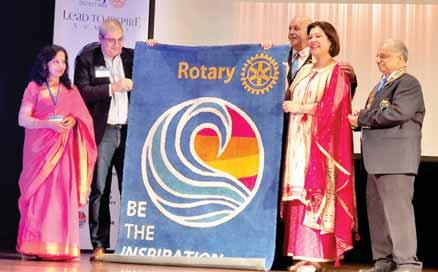

(Clockwise from top) At an inter-city Rotary clubs’ meet RI President Barry Rassin and Esther are presented his theme ‘Be the Inspiration’ woven in a tapestry. DG Praveen Goyal (L) and PDG Raman Aneja and Basu Goyal are also seen; Artists depict Punjab’s traditional phulkari embroidery at the Peace Rally; Usha Saboo with Rotarian spouses at a dinner hosted by the Saboo family; President Rassin and Esther and PRIP Rajendra Saboo and Usha and DG Praveen Goyal with PDGs and spouses from D 3080; Interactors hold up peace posters at the Peace Rally; President Rassin, Esther and PRIP Saboo, and PDG Madhukar Malhotra with invitees at the dinner hosted by the Saboos.
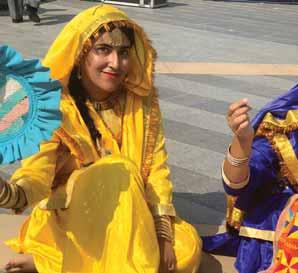
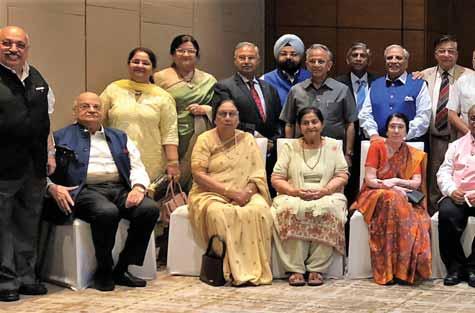
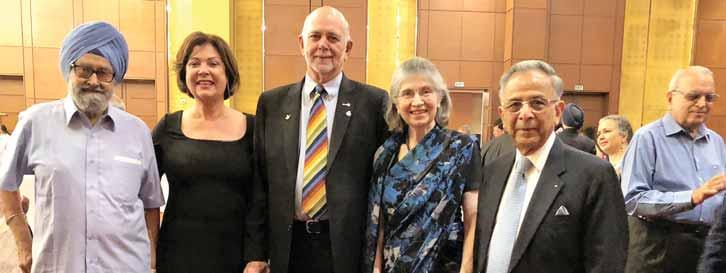






RI President Nominee’s felicitations
Team Rotary News
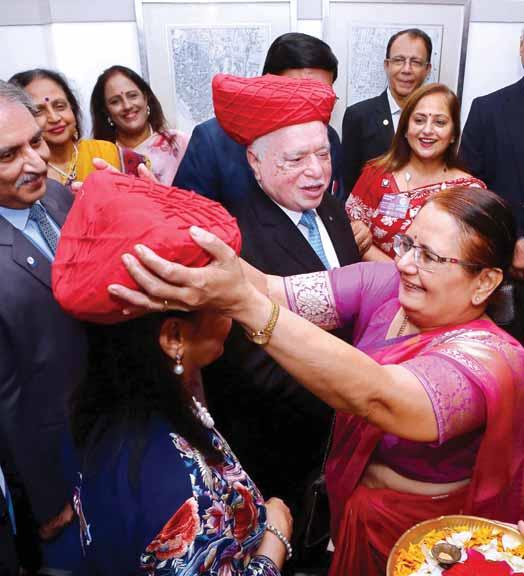

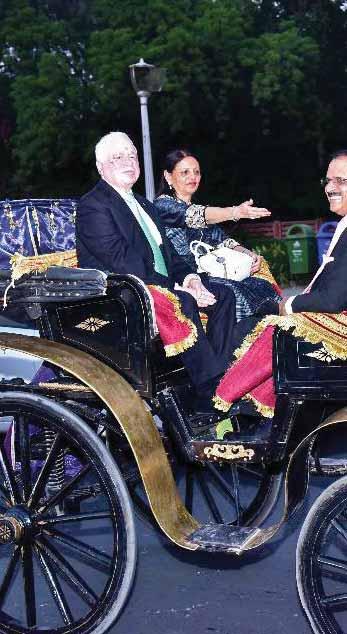

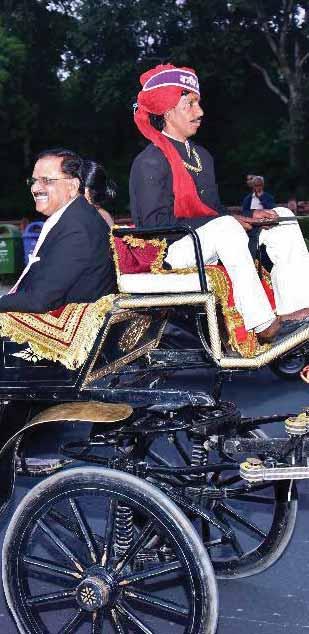
Clockwise: From L: DGN Harish Motwani, DGs Ravikiran Kulkarni, Rajiv Sharma, Shailesh Palekar, PRIP Kalyan Banerjee, Binota, RIDE Bharat Pandya, RIPN Sushil Gupta, Vinita, Madhavi, PRID Ashok Mahajan, Nayantara, TRF Trustee Gulam Vahanvaty, DGs Shashi Sharma and Ashes Ganguly; PDG Ashok Gupta and Vijaya present a memento to RIPN Gupta and Vinita in the presence of (from R) PDGs Ajay Kala, Mohan Bhai Shah and Sunita Kala (left); RIPN Gupta and Vinita with PDG Ashok Gupta; Madhavi greets Vinita with a pagdi as RIPN Sushil Gupta looks on.
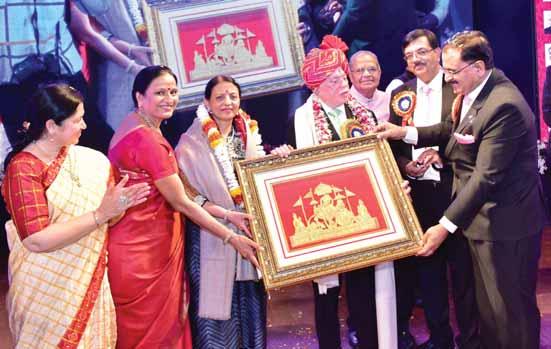
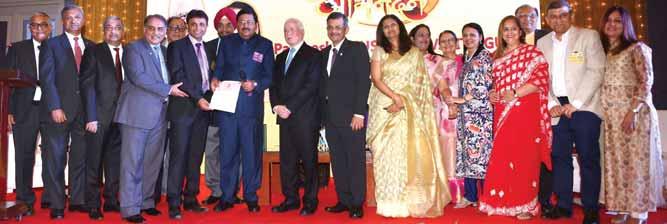
At a felicitation meet for RIPN Sushil Gupta and Vinita hosted at Mumbai by Districts 3030, 3131, 3132, 3141, 3142 and 3170, Convener and RIDE Bharat Pandya and Madhavi greeted the couple with a traditional Peshwai Pagdi. The felicitation was crisp, addressed by PRIP Kalyan Banerjee, TRF Trustee Gulam Vahanvaty, PRID Ashok Mahajan and
Pandya. All the six District Governors congratulated Gupta and promised him full support for his “dreams and goals” during his Presidential year 2020–21.
In Jaipur, at another felicitation session, the couple was welcomed to the Pink City by PDGs Ashok Gupta and Ajay Kala.
In his response, RIPN Gupta shared his dreams and vision and while appreciating the good work done by all these
districts, challenged them to work towards his dream of making 10,000 villages in India free from avoidable blindness by June 30, 2021.
An MOU was signed at the event between President of RC Bombay Airport Suketu Jariwala and D 3141 DG Shashi Sharma for three years for putting up a vocational centre at the one-acre plot donated in Wada district by Jariwala.
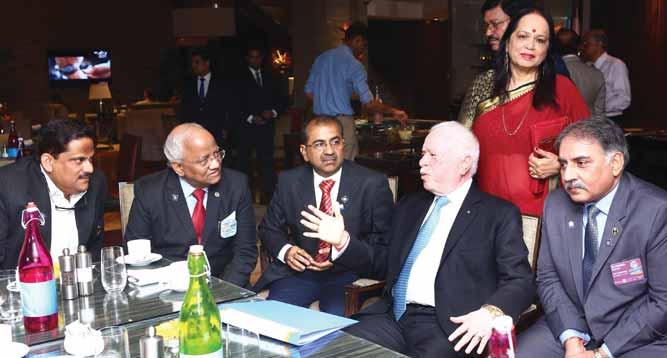
Designed by N Krishnamurthy
RCJammu Aastha, D 3170, organised an eight-day judo coaching camp for 30 visually-challenged girls at the Louis Braille School in Jammu. The purpose of the programme was to engage them in a fun activity and help them combat social isolation, besides empowering them with self-defence techniques, says the Project Director Suraj Bhan Singh who is a judo coach in the Jammu and Kashmir Sports Council.
The girls participated in competitions after their training. Ranjeet Kalra, President of Jammu and Kashmir Blind and Para Judo Association, was the chief guest.
Four girls from this school had participated at the National Para Judo Championship last year. None of them won, but “we learned that if we want to win, we must not concentrate
on the clapping and cheering by the audience. Next year we will definitely win,” says Bhumika, a judo player from the school.
“These girls are at a greater risk of physical and sexual abuse owing to their disability. Many of them can’t even leave their homes unaccompanied. This art empowers them to step out and embrace a whole new world,” says the coach.
Bhumika says that when she was introduced to the sport two years ago, “I wondered if I could do it. Our coach patiently made us understand the rules and trained us to balance our weight. Now we practise three days a week.”
“Working with the visually-impaired can be difficult initially, but the effort and attitude they bring to the field is overwhelming and satisfying,” says Singh.

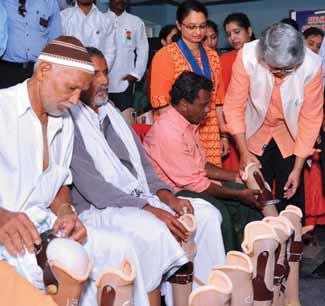
Kushalnagar is a serene town located between Mysuru and Madikeri in Kodagu district of Karnataka. Its twin town Bylakuppe is one of the largest Tibetan settlement that houses the Buddhist Namdroling Monastery, also known as the Golden temple.
RC Kushalnagar, D 3181, has been reaching out to the people of these two towns since 1975 with humanitarian projects such as medical camps, providing water facilities, construction of toilets in
the surrounding hamlets and supporting local schools with infrastructure.
More recently, the club, along with RC Coimbatore Midtown, D 3201, distributed artificial limbs to 50 physically-challenged people in the presence of PDG Ravi Appaji. “This is our club’s ongoing project for the past six years,” says the Club Secretary Premchand. In another event, the Rotarians equipped the Ashwini Hospitals in Madikeri with medical equipment under a global grant worth `65 lakh, with the support of 22 clubs from the US and TRF.

RI President Barry Rassin and RI Director C Basker participated in the golden jubilee celebrations of RC Madras North, D 3232, on the sidelines of the Chennai Institute. RIDE Bharat Pandya was the chief guest and RI Director Eun-soo Moon was also present.
PDG G Olivannan and President Venkatesh highlighted their club’s significant journey over the past 50 years, including a wholesome development of Naapalayam village on the city’s outskirts. “We have made the village cataract-free,” said Olivannan.
President Rassin lauded the club’s endeavours. “We know that people out there need us and we Rotarians pull up our socks and say, ‘yes, we are here and we are going to make a difference.’
And I thank you for all those lives you have touched and transformed.” Director Basker urged the club to “build strong partnerships with corporates and undertake large projects. Your club must continue to serve for another 50 years and celebrate the centenary.”
RIDE Pandya said, “We live in a beautiful world but when we open the newspapers or switch on our TVs, all we read or see is more of darkness — corruption, starvation, abuse and rape. And I always wonder if the small projects that we implement through Rotary can really make any difference”. But then, as Confucius said, “It is better to light a candle than curse the darkness. And I congratulate you for making a difference in so many people’s lives during this milestone journey. You
have been removing the darkness, lighting hopes and daring people to dream.” Pandya also urged the audience to remember the hard work of all the stalwarts who have helped in sustaining the club for so long.
The club conferred the ‘Golden Jubilee Eminent Citizen Award’ on N Ram, Chairman, The Hindu group of publications. Ram commended Rotary for the successful eradication of Polio and the integrity with which the effort was done. “Keeping the cold chain without any compromise and delivering it to the rural areas — that work has been superior to any other country.” He touched upon the impact of the digital media over the print media and the various challenges faced by the media. “Corruption has affected news media

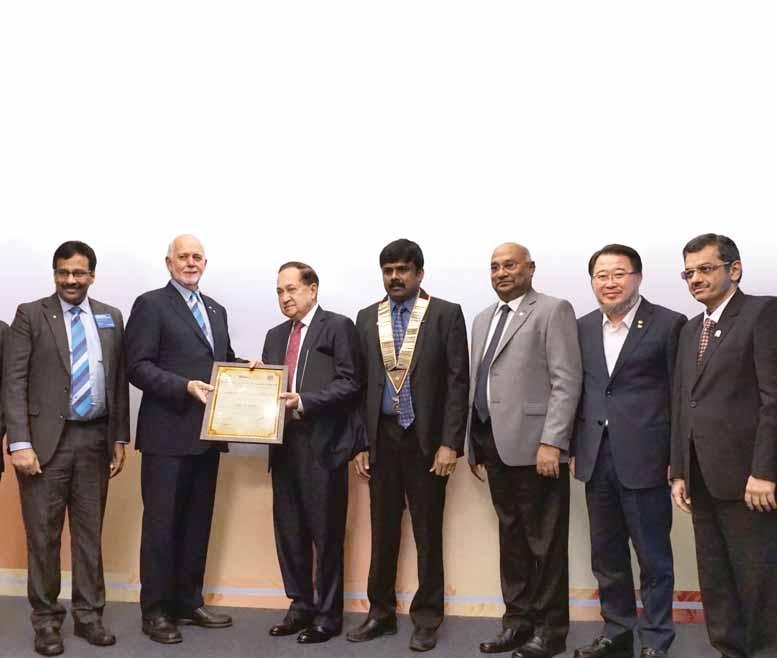

and journalism as well. Unless those of us in the field recognise this, we will only be pointing fingers at others and will not be able to clean up the profession,” he said.
While many people in the news media thought that press freedom in India was at a high level compared to most developing countries, in the present scenario, the picture appeared far less bright, he said. This was due to two factors — laws that have been unreasonably interpreted and often misused so that they have a killing
effect on free speech and a visible increase of intolerance in society.
“Defence and promotion of fundamental right of freedom of speech and expression must be taken up by all citizens as a top national priority. Having said that, it goes without saying that freedom comes with social responsibility and this applies to the press and other news media as much as it does to every citizen,” he added.
The club honoured its member Suresh Krishna with the ‘Most Valuable Citizen Award’.
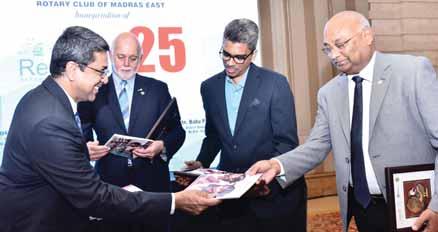
Rassin also launched the ‘Rebuild 25’ project of RC Madras East. The club is the implementing partner for this $550,000 project, funded by Cognizant Outreach, the IT major’s CSR wing, to renovate 25 government schools. “Selection of contractors, execution and quality control were the club’s responsibility. A team led by Nagarajan, our member and an expert project manager, is handling the assignment very capably,” said the Club President R M Narayanan.
Rassin and Basker complimented the club for enhancing the learning experience for 8,000 students in the 25 schools. A coffee table book on this project was released on the occasion.
A bicycle rally, organised by RC Madras Midtown, involving 3,000 Rotaractors and Rotarians spreading the message of road safety, and an all-women’s car rally, organised by RC Chennai Meraki, to propagate literacy, women’s empowerment, environment protection and road safety were flagged off by the RI President and Director as part of the Institute.

District Representatives of Zones 4, 5 and 6A got a taste of the 2019 Council on Legislation (CoL) to be held in Evanston, at a mock session which formed part of the Chennai Zone Institute. Alongside training, this session provided an overview of the Council and allowed new representatives to consult and interact with past representatives of the CoL. PDGs T N Subramanian, P T Ramkumar and the Deputy General Counsel from RI, Maureen Ninneman, explained in detail the Dos and Don’ts and the procedure to be adhered to at the CoL.
“The sergeants at the CoL are tough, you cannot waste time on last minute coffee with your spouse,” warned Subramanian. Maureen pointed out that the representatives to the CoL must have attended their Zone Institute and completed the new online training course, in order to have their Council expenses funded by Rotary. Unless they have an exemption from the Council Chairman. “Representatives who do not complete the training an attend the Council, but they will be responsible for their own expenses.”
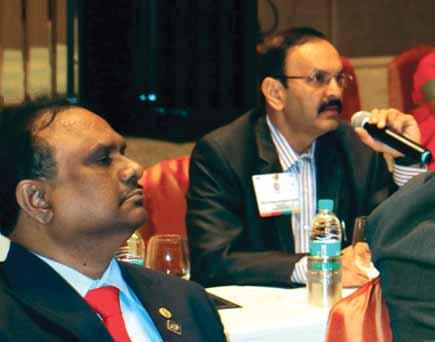
PDGs G Vasikaran and Deepak Purohit.
CoL Seminar Chair T N Subramanian addressing the delegates.

The session saw representatives discuss, practise and review the Indian enactments printed in the proposed legislation 2019, a copy of which was handed out to all participants. Maureen stressed that all representatives “must study the legislation” before attending the CoL and plan strategies they could use at the programme.
“Download the CoL App, because it will act as your entry pass, lunch token and reminder. All notifications will be sent to you through the App,” she said. Moving on to rules she reminded the representatives, “You will be given three precious minutes. Whatever you say has to be concise and factual.” But even before all that, “discuss proposed legislation at the district conference or other meetings and
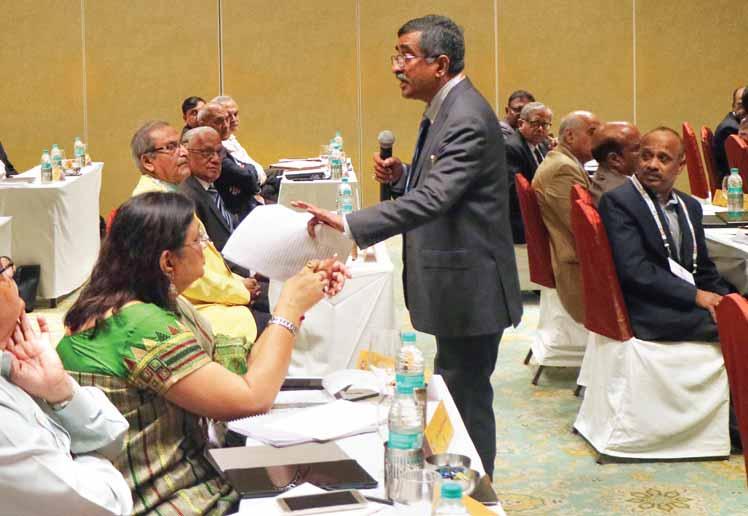
understand the different perspectives of Rotarians within your district and make sure you act as an objective legislator of RI.” Also, they have to attend the entire meeting of the Council which meets for five days from 8.30 am to 6 pm.
In an interactive round, the Rules of Procedure — how a resolution is to be tabled/withdrawn, how to move a motion, what are the motions that are debatable/amendable, were discussed. There are two kinds of proposals: an enactment, which would amend the constitution or by-laws of RI or a club, and a resolution, which expresses an opinion or makes a recommendation to the RI Board, explained Subramanian. “Whether you are ‘for’ or ‘against’ an enactment, you must wait for the debate to be completed to reach a conclusion.
Many times, your opinion may change after the debate because you are thrown open to other representatives’ opinion.”
On the use of cards, Maureen explained that, “the green is ‘for’ the proposal, red shows you are ‘against’ and you will be using these cards only during the discussion phase.” Using the yellow card will represent that “you want to move an amendment or use it as a point of information. Make a note of your doubts regarding the proposal and ask the Chair without fear. The yellow and blue striped card is specifically used for closure. You flash it and the Chair will close the debate midway. So, without understanding the cards, do not use them.”
PDG Rekha Shetty, D 3232’s representative for the 2019 CoL, said that
“this was a great learning experience and has helped in understating how to go about things.”
Highlights of the 2016 CoL were also discussed.
Describing the critical role of the CoL, Maureen said, “Over decades, the Council has debated and weighed virtually every nuance of the RI policy and every detail of membership, attendance rules and dues. While individual Rotarians may not always agree with its decisions, the Council is Rotary’s primary agent for change, allowing the organisation to evaluate its relevance in today’s rapidly evolving world, reflecting shifts in lifestyles, priorities, technology, and business.”
Pictures by K Vishwanathan

nspirtational speaker Mahatria Ra, addressing the Chennai Institute, gave a new perspective to the RI President’s theme — Be the inspiration.
Referring to the `100 crore generous contribution of RC Bangalore Orchards President D Ravi Shankar, he said, “Don’t get carried away by numbers. The inspiration is not the number. Then you go into speculations such as he has so he gave. The `100 crore does not make him a great human being. That he had a heart to give makes him great. You should draw inspiration from that. The very act of Ravi Shankar’s giving is to inspire others to give whatever possible from within their means.”
The number of nerves that goes from the eyes to the brain is much greater than those connecting the ears and the brain. People get inspired by what they see more than from what they hear. “The greatest poverty in the world is the poverty of living role models. Why are we still quoting Mahatma Gandhi, Jesus Christ or
Mother Teresa? Why should there be historical references to inspire people?
Each of us can be a role model if we are true to ourselves. You must realise that the greatest gift Rotary has given you is the number of beautiful human beings it has got into your life. If we have to build ‘one world, one humanity’, not distinguished by colour, caste or nationality, Rotary is the way and it has only one purpose — serving humanity,” he said.
Prescribing the way for a holistic life, Ra stressed on achieving a balance in five dimensions of one’s life — health, wealth, love, bliss and spirituality. “Despite achieving so much, there is an incompleteness in all of us. We don’t know what we are searching for, but we are searching.” Urging the delegates to achieve a balanced life, he said: “Push your body a little more than it feels comfortable. Evaluate your food intake — if it is pleasurable or healthy. Never stop learning and developing yourself. Be a giver in relationships and not a beggar. Quieten your mind and still your body


for three minutes daily. “By doing all these you will be a holistic inspiration to people around you,” he said.
Sri Lanka’s Minister for Finance and Mass Media Eran Wickramaratne spoke on how the government and Rotary can work in sync for building a healthy nation. He complimented PRIP K R Ravindran who was then the DG of D 3220 (Sri Lanka) for negotiating a ceasefire with the LTTE to continue polio immunisation in the troubled regions of the island nation. “What was impossible was made possible by Ravindran. He said, ‘don’t worry about the conflict. We will take care of it.’ The government did not have access or control in those areas during that period.”
Rotary’s contribution in Sri Lanka was “not just armchair charity,” he said and referred to the swift response of Rotarians during the tsunami in 2004, and the schools and maternity hospitals built thereafter.

He suggested two ideas for Rotarians to supplement governments worldwide; by providing support for aging population, and caring for the environment. While the world faced an average 40 environment crises until 2014, the number has shot up to 300–400 natural disasters. “This is the new normal,” said the minister. Tsunamis, droughts, floods — all these involve loss of lives and assets. Even with the new instruments such as insurance against disaster risk and so forth, we cannot meet the huge need that is out there. “We need your support in water management, soil conservation, agriculture etc,” he said.
Chairing the session PRID Ashok Mahajan said, “Rotary’s strength is that it knows no borders and Rotarians are raring to go anywhere to serve mankind.”
You can pay the Rotary News / Rotary Samachar subscription online
Our Bank details:
Bank : HDFC Bank SB Account
Branch : Egmore, Chennai
A/c Name : Rotary News Trust
A/c No. : 50100213133460
IFSC Code : HDFC0003820
E mail us following details:
Name of Club
President/Secretary’s name
Amount/Date of transfer/UTR Number
For physical payment by cheque or cash in bank, write Club Name only without prefixing “Rotary club of”. Eg. Rotary Club of Delhi Central should be written: Delhi Central.

At the Chennai Institute, spouses of incoming governors learnt the nuances of providing support to their partners’ progress in Rotary. Addressing the spouses, Usha Saboo recalled her experience as a DGN spouse in 1976, when she attended her first Rotary International Assembly (IA) at Florida. “We did not get any advice on what to do there. As a timid Indian housewife, I was shocked to see so many people from across the world hugging and kissing each other. I was yet to discover the warm culture of Rotary when I was kissed on the cheek by a total stranger! But you are lucky that you have a training programme and can learn.”
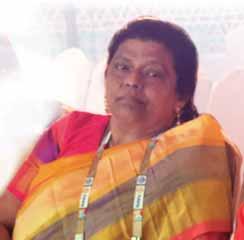
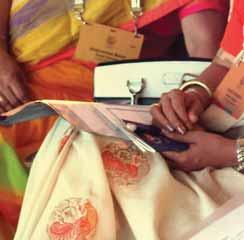
Putting the spotlight on service she added that in Oct 1998 when she accompanied her husband PRIP Raja Saboo to Uganda on their first medical mission, “life started afresh for me. I was only a volunteer at the mission. But I played the role of a mother consoling a child who was crying while waiting for his turn at the hospital; a nurse assisting doctors; and a waiter giving out coffee. This is no place for self-glorification. You have to work for the cause of Rotary.” Amidst great applause and broad smiles, she asked the spouses: “Could I have achieved so much without being a Rotary spouse? So dear partners, prepare yourself for Rotary. Reinvent yourself.”





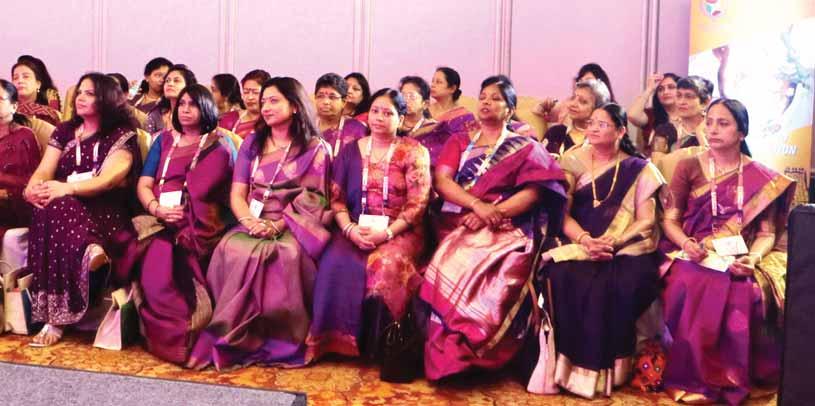
You are the Shakti
Nalini Prabhakar, spouse of PRID P T Prabhakar, referring to the VHS Dialysis Centre in Chennai, said that as an individual anyone could sponsor the cost of one or few free dialysis. “But with Rotary, we can set up a dialysis unit and provide free dialysis for thousands of poor people. The power of service through Rotary increases and the community at large is benefitted exponentially.” She shared an interesting video of Bertha Benz, the business partner and wife of automobile inventor Karl Benz who had no faith or confidence in his first automobile invention.
Determined to prove to him that his invention, in which they both had invested, would become a financial success, in 1888 she took the first cross-country automobile journey in the same vehicle covering 106 km. Not only did she bring the Benz Patent-Motorwagen worldwide attention, she also strengthened her husband’s confidence that his invention had a future. “Bertha drove more than a car… she drove an industry. Similarly, your spouse may be leading the district but you are his Shakti and
it is you who will be driving service through your district,” she added.
Mala Basker reminded the spouses that “your busy time starts now. Participate proactively and don’t miss out on any opportunity to be the inspiration to Rotary partners around the world and within your district. I wish you all the best for your year.” The spouses were then engaged in a day-long interaction and activities for them to understand the Presidential theme and priorities, their role in service and how they could add more meaning to their district conference using the lessons learnt at the IA.
“The purpose of the International Assembly is to impart knowledge and skills to support your spouse and teach you to be effective and efficient,” said Marlene Kamdar, spouse of PDG J B Kamdar, D 3232. Guiding the spouses through the Assembly to Action session, she asked them to share their learning with the first ladies of the clubs in the district. “They don’t learn as much from what you speak but from what you do. They watch you. So, don’t preach. Let your actions teach them.”
Sonal Sanghvi and Dr Madhavi Pandya, spouses of RIDEs Kamal Sanghvi and Bharat Pandya, elaborated on the preparation and participation for the partners’ programme at IA. “This will be a life-changing experience,” said Sonal. Madhavi reminded the spouses that “attendance for all sessions is compulsory and do ensure you download the Assembly App.”
The spouses counter is the most attractive feature at the IA. “Usually our zones’ counter is always packed because we have a colourful display and engage the visitors in some activity or perform one of our traditional dances. So please discuss with the current DG’s spouse in your district and get ideas,” added Sonal.
Ritu Choudhary, spouse of PDG Ravi Choudary; Nalini Olivannan, spouse of PDG G Olivannan and Vidyottama Sharma, spouse of PDG Prafull Sharma, were the other resource persons and the discussions ranged from concession in dues for spouse-members to dual membership in Rotary for Innerwheel members and enhancing communication skills.
Pictures by K Vishwanathan

As the entire Rotary world looks forward to eliminating the last cases of Polio from Afghanistan and Pakistan, at the Chennai Institute, PDG Aziz Memon, Pakistan National PolioPlus Committee Chair, had a bit of cheerful news to share. “Let’s look at the provinces in the FATA (Federally Administered Tribal Areas) area of Pakistan, which is a mountainous region where the Taliban is stationed, and when Pakistan once had 306 cases of polio, 182 came from FATA alone. But in the last two years, not a single polio case has been reported from FATA.”
Even looking at the overall picture in both the countries of Afghanistan and Pakistan, “we have progressed from 306 cases in 2013–14 to only 19 (unfortunately last evening one more case was reported from Afghanistan) this year — four from Pakistan and 15
from Afghanistan,” he said, addressing
a session on Polio Update in Pakistan and Afghanistan.
One of their bigger challenges was Karachi, a city of 23 million people, with so many slums and very poor hygiene, lack of clean drinking water. “We’ve done a good job here also and in the last 20 months we’ve not seen any case of polio from Karachi.”
Even last year, Pakistan had reported eight cases, but these have come down to four in 2018. While Afghanistan had reported 15 cases, “in Nigeria, the good news is there has been no new case for more than two years, and they should be done very soon, as there have been improvements in routine immunisation in Nigeria.”
Returning to Pakistan, Memon said that in one NID, 37.7 million children are vaccinated, using social mobilisers and vaccinators. Earlier the polio vaccinators were hired on a daily wage
of `250; this has now been changed to local community-based volunteers, who now get a monthly wage of `15,000. This has made a difference and now all the high-risk areas of Pakistan have got local community-based volunteers.”
In their polio eradication drive Pakistani Rotarians work in close partnership with the Government. Displaying a picture of Pakistan Prime Minister Imran Khan giving polio drops some 18 months ago to a child in the Khyber Pakhtunkhwa region of Pakistan, where his party was then in power, Memon said, “Even now we are in touch with him; we have started interacting with the new political leadership and I can assure you they are fully on board and we are all resolved and motivated that polio should be eradicated totally from Pakistan.”
(From L) TRF Trustee Mike Webb, Pakistan National PolioPlus Chair Aziz Memon, PRID Panduranga Setty and INPPC Chair Deepak Kapur.
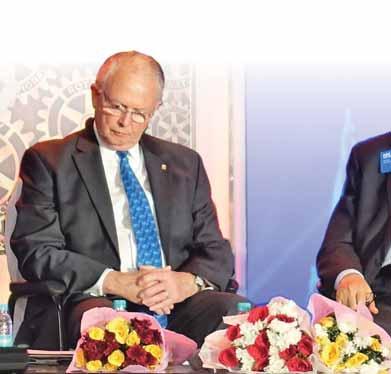

With the “guidance of PRID Ashok Mahajan, we have created an Ulema committee which meets regularly, and we do workshops for them so they can address the community. I can tell you that the refusals to immunise their children have come down drastically. And where there are refusals, they are on the grounds that we have no drinking water, we have no electricity, there is filth and dirt everywhere, etc, and we try to help there also. But chronic refusals are no longer there thanks to the work of the Ulema committee.”
Among the partnerships Rotary is striking with corporates, very successful has been one with Coca Cola, which has put up water filtration plants to provide safe drinking water to 20,000 families. “This is making miracles and the press release for the last plant inaugural we sent was picked up by 32 newspapers and the headline was ‘Rotary Coke partnership provides drinking water’. This is helping Rotary’s public image also.”
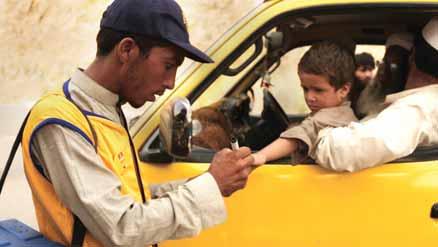
a Rotary transit post for polio immunisation wherever there is an army or police post to check the buses. Last year we got evaluation done by an independent body and found that 3.5 million children were given OPV at the Rotary-provided polio transit posts.”
the youngest only nine months old. We immediately gave the first cheque for `5,000. Later with help from other donors we got the family a house.”
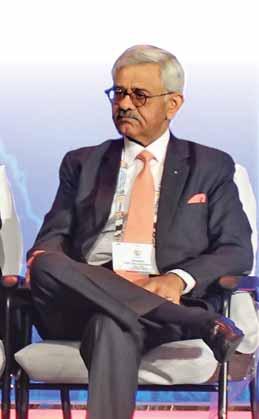
ficult
Memon added that at the PakAfghan border which has all the difficult transit points, “we have put up
“we put u
The problem in Afghanistan was that the polio cases were reported from areas such as Kandahar, which had a huge security issue, and in one particular corridor, in the last seven months no child had been able to get a single drop of polio vaccine. Even the most recent case had been reported from Kandahar, and that made a total of 10 cases from Kandahar alone.
“Whenever there is a case reported from the Afghan border it sends alarm bells ringing for us because we have a 2,450-km porous border with Afghanistan, where a lot of movement takes place, so reaching every child moving from one to the other country is a tough task,” he added.
Memon concluded by saying that so far 187 vaccinators have been killed in Pakistan, the last being in Jan 2018. “Outside Quetta, Sakina (40) and her daughter (15) were shot at and they died instantly. Sakina comes from the poorest of poor families, her husband is a taxi driver, and has left behind five children,
He added that PRIP K R Ravindran had visited Pakistan during his presidency and suggested that once Rotary was done with polio, these vaccinators will be forgotten, so something concrete should be done. So five scholarships in public health titled Rotary PolioPlus Memorial scholarships have been set up to benefit the community.
In his address, which due to lack of time was curtailed to 10 minutes, INPPC Chair Deepak Kapur wondered how he would sum up the story of “three decades’ struggle, disappointments, achievements and success” in 10 minutes. But it would take less than 10 minutes to demolish the work done by Rotarians and others by an entity called the media which could spread misinformation about the return of polio to India, as had happened in early October.
One thought he left the audience with was: “Every 10 minutes, Rajashree Birla contributes over `1,700, and has done so through the years, year after year, till the corpus has added up to over $12 million.”
Picture by Rasheeda Bhagat
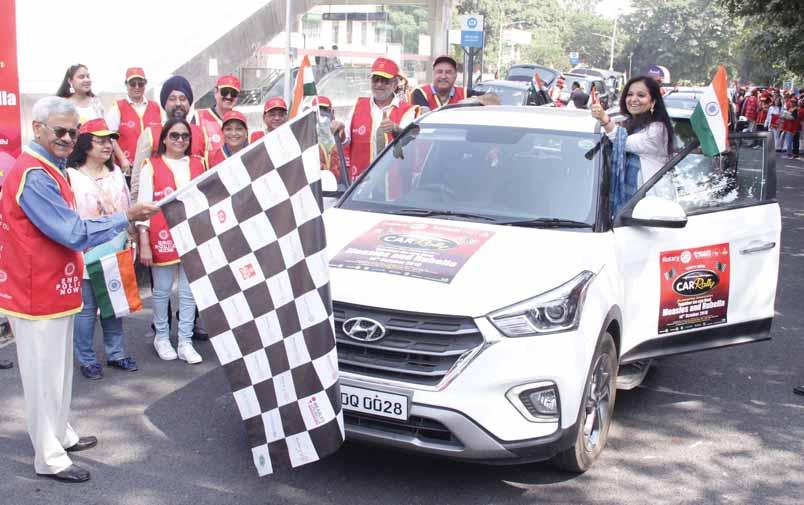
Most of the world, except Pakistan and Afghanistan, is polio-free. Still Rotarians urge people to continue immunising their children against the dreadful virus. Though India is officially Polio-free since March 2014, there is every chance of children contracting the disease when the virus is still lurking in our neighbouring countries. The virus knows no borders and it can spread from a polio-affected person visiting from countries where it is still present, reiterate Rotary leaders in India.
October 24, observed as the World Polio Day, marks the birth anniversary
of Jonas Salk who developed a vaccine to protect children from polio. On this day, several clubs created mass awareness through rallies and programmes, urging people to get their children immunised on the NIDs and keep their surroundings healthy.
A glimpse into some of the events:
A car rally to spread awareness on Measles, Rubella and Polio was jointly organised by the INPPC, RI Districts 3011, 3012 and the Inner Wheel District 301. INPPC Chair Deepak Kapur and DG Vinay Bhatia flagged off the rally at various locations. RIPN Sushil Gupta and RID
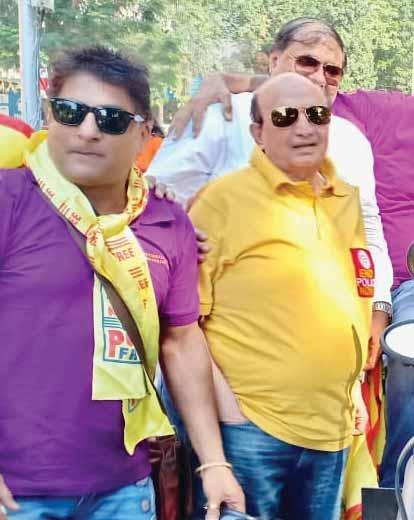

C Basker addressed a huge gathering at the culmination of the rally. Officials from the WHO and UNICEF also participated in the programme.

PRID Ashok Mahajan flagged off a car rally in Mulund, Mumbai, where 125 Rotarians and several Rotaractors participated.
RIPN Sushil Gupta and Vinita who were in Kolkata for a felicitation event, flagged off a car rally from the Rotary Sadan. Around 300 participants from 26 clubs registered with 72 brightly-decorated cars. PRID Shekhar Mehta, DG Mukul Sinha, PDGs Debasish Mitra, Ravi Sehgal and Ramesh Agarwal (D 3011) were also present. The rally was hosted by RCs Belur, Calcutta, Calcutta Central and Calcutta Mayfair.
Preeti Verma Lal
At 11,562 ft above sea level, a duff pair of lungs gasps for breath. It requires pails of oxygen. Not squawks of instructions. But at Leh’s Kushok Bakula Rimpoche Airport, warnings arrive before the bags tumble on to the carousel. Rest for at least 24 hours. Do not step out for sight-seeing. Do not sleep during the day. You might get disoriented. If you get a nose bleed, headache or feel nauseous, see a doctor. Avoid alcohol and caffeine.
I had landed in the world’s 22 nd highest airport for the five-day Naropa Festival with piety packed in my heart. But it was panic that I stumbled upon first. Fatigued travellers were debating over dos and don’ts, rattling off names of medicines in their pouch — one with a guffaw confessing that he is carrying an entire
‘pharmacy’. “You never know… ICE. In case of emergency.” I heard him unfold an abbreviation nervously, fetch his bags and hurry out in the cold desert. My mind stepped back 1,000 years. No, I was not disoriented. I was thinking of a young boy called Naropa (1016–1041), who later became the Keeper of the North Gate of Nalanda University,

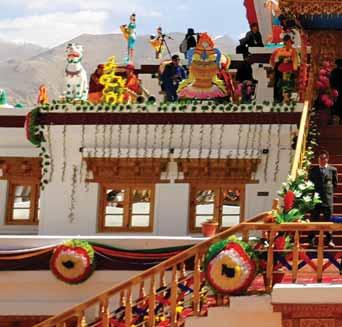

attained enlightenment and structured the Six Yogas which now form an essential part of Vajrayana Buddhism. Considered one of the 84 mahasiddhas of Vajrayana, there’s the lore of the day when Naropa attained enlightenmentdakinis gifted Six Bone Ornaments to Naropa and flew into the sky.
It was the Six Bone relic that had lured me to the 2018 Naropa Festival in Leh. The road to Hemis Monastery was rutted, the poplars tall and the terrain desolate. Army personnel in camouflage were many, so were Royal Enfields and monks in maroon. On the way lay the Rancho School (the one featured in Hindi film 3 Idiots) and a million posters of the festival pasted with faces of singers Kailash Kher, Sonu Nigam and Swaransh Mishra. I sped past familiar faces, ancient monasteries,
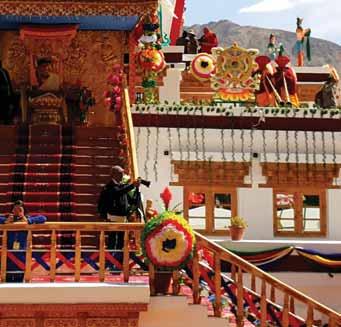


the gurgling Indus, and bustling villages to the 17th century Hemis.
The crowd was milling around the main venue of the festival, often called the ‘Kumbh of the Himalayas’. But this was not the big Naropa, the one held every 12 years. This was the first time the festival had broken the 12-year routine and was being held two years after the mega festival of 2016.
Sitting on a red rug, I waited for the relics that included anklets, bangles, crown, earrings, necklace and seralkha. Devotees believe that the mere sight of these ornaments would confer blessings so great that the doors to the three lower realms — animal, hungry ghost, and hell — are closed. I was not looking for salvation or the doors of the lower realms to close. I sat there without beseeching the Naropa for anything. Except blessings for the entire world.
When the palanquin with marigold yellow satin umbrella drew closer and the sound of the cymbals hit a crescendo, I was caught in the melee. In a sea of humans. Young monks stood with murmurs of prayers on their lips.
A man in fake Dolce & Gabbana sunglasses ambled with a prayer wheel in hand. A little girl in pink fleece scurried by, whooping at the sight of the palanquin. The more pious sat there solemnly in belief that the Naropa will bless them. However far they are from him.
I sat on the red carpet with the curious, the onlooker, the pious and the agnostic. The air was redolent with the whiff of incense, the sky resonating with the sound of oboe, drums, trumpets
and cymbals. Entry to the sanctum was restricted and photography strictly prohibited. Stern securitymen were ushering the crowd and there was not a moment extra to gaze at the ornaments. I got a glimpse. That is all.
There was more to the day. Traditional dances, spiritual discourses, official launch of the Naropa Fellowship, release of Ladakh’s first EDM CD and lunch in a large tent with the snowcapped mountains staring at my bowl
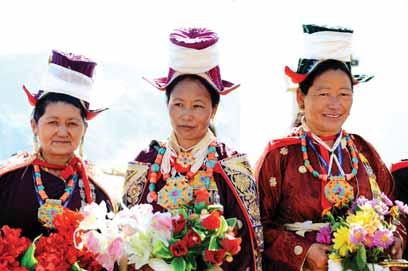
Thukpa : A noodle soup with boiled vegetables, chunks of chicken, pork, beef or mutton
Tigmo : A vegetable or meat stew with fermented bread placed in it
Khambir : Thick bread
Mokthuk : Essentially, momos in soup
Skyu : Stew with thumbsized wheat balls cooked with meat/ vegetables
Chaang : Local fermented brew
Chupri : Cheese made of yak’s milk
of rice and vegetables. The shops were laden with local handicraft and women in intricate jewellery were pouring yakmilk salted tea from gigantic flasks.
His Holiness Gyalwang Drukpa, the 12th reincarnation of Naropa and
Monks await the arrival of the Six Bone Ornaments.

the current head of the Drukpa lineage, was not present. But I sat at the feet of His Eminence Thuksey Rinpoche as he talked of compassion, the need to save the environment, and the no-littering, no-plastic initiative of the Buddhist order. On way back to the hotel, I stepped into the Stray Animal Rescue and Management Centre founded by His Holiness Gyalwang Drukpa, where

injured and abandoned dogs, camels, donkeys, horses, poultry are looked after. In the cold desert, compassion has found home.
Another day, another bumpy ride to the Hemis to look at the Thangka of the Buddha Amitabha. One of the largest thangkas in the world, the 60 ft silk embroidered brocade of the Buddha Amitabha was unfurled on Day 2 of the Naropa festival. Perched on a metal scaffolding, the Thangka was open for public viewing between 8 am and noon for four days.
As I hurried up the steps of the main monastery of Hemis, a snow flurry descended from the blue sky. Science would call it a light snowfall that results in little or no snow accumulation. At Hemis, I believed the snow flurry was a benediction of the Naropa. Perhaps he closed the doors of the three lower realms for me. Perhaps he blessed the entire world.
I sought no shelter from the snow. At the Naropa Festival, I let the snow flurry dress me in white.
Pictures by Preeti Verma Lal Designed by Krishnapratheesh S







Gustad Anklesaria
Automobile distribution
RC Ratlam, D 3040
Athird generation Rotarian, Gustad Anklesaria has Rotary blood in his veins. He has been an Interactor and Rotaractor before joining Rotary in 1989. While his father T S Anklesaria is a past district governor, grandfather G D Anklesaria was instrumental in establishing the 4,000 sq ft Rotary Hall in Ratlam in 1962.
The DG is happy to share that 65 per cent of the total 111 members in his club have been Rotaractors before becoming Rotarians.
He is happy that he is getting a first-hand feel of the various sustainable projects being implemented by his team. “We run nine dialysis centres, a blood bank in Ujjain, ten physiotherapy centres and several food centres through which we provide lunch/dinner for a mere ` 5.” He plans to add at least five new dialysis centres, one more blood bank, an ambulance for animal care, a mammography van and 100 e-learning facilities during the year.
On membership he plans a 25 per cent growth and has already inducted 10 per cent more women members. The biggest challenge, he says, is the large amount of non-reported Rotaract clubs in the district. “We are now streamlining data on these clubs,” he says.
Anklesaria is hopeful of raising TRF contribution from his district, that is thrice the average collection of $100,000 through the years.
Barjesh Singhal
Stock broker, RC Jalandhar, D 3070
He is a Rotarian since 1992.
Barjesh Singhal is excited that he has added 200 new members so far and that the women members, “though they form just 10 per cent of the total membership, are active in pursuing service activities in the district. I am working on increasing the number by another 10 per cent.”
He is also happy that all Rotary clubs have uploaded their goals on the Rotary Club Central and he is now aiming at 100 per cent registration of the clubs in My Rotary before the end of the year.
On contributions to TRF, Singhal says that while the trend so far has been 30 per cent clubs and 70 per cent Rotarians donating to the Foundation, this year he is all set to reverse the trend so that 97 per cent clubs and 70 per cent Rotarians participate in contributing to TRF. “Even if it is $50 or $100, it is okay.
The point is that all Rotarians should give to the Foundation. This has been well-received in the district. So I know I can expect a decent contribution. We also have five new Major Donors this year.”
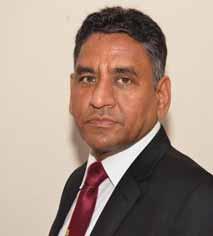
His agenda for service projects includes executing WinS projects with CSR participation and establishing a Peace Park at the India-Pakistan border by 2022. A nine-member committee headed by PDG Kees of D 5080 has been set up for this purpose. He aims to plant 25,000 saplings across the district before the year ends. “The team has been encouraged to do away with shawls and flowers during events. Instead, they will be giving saplings,” he says.
Singhal is happy to share that he has given `13 lakh as aid from his district to DG E K Luke for Kerala flood relief.
Civil lawyer, RC Chandigarh, D 3080
He has planned his projects in a way to enthuse all Rotarians to take part in what he calls ‘fortnight challenge’. The programmes for July included providing bird baths in communities, providing large umbrellas for roadside hawkers, cobblers etc. “These projects will enhance Rotary’s public image,” says Praveen Chander Goyal. Other projects under his ‘challenge’ programme include adolescent healthcare and road safety projects.

Goyal has served as an Interactor and a DRR in 1985–86 before joining Rotary in 1988. He wants to increase membership by 10 per cent and double the number of ‘reported’ Rotaract clubs from 30
to 60 and add 10 per cent more women members. He is excited to state that his district has chartered an exclusive Rotaract club with visually-challenged members and another one will be chartered in November.
“RI President Barry Rassin gave the charter certificate to the club during his Chandigarh visit and he was very much impressed,” he says.
His goals for TRF is to raise $600,000 but “I have not been able to do much. My next Fortnight Challenge will be for every member to contribute to the Foundation,” he smiles.
He is presently working on a global grant that has been sanctioned to equip schools with WinS facilities and furniture.
Civil Engineer, RC Cuddalore Coastal City, D 2981
He has lined up four projects aimed at enhancing Rotary’s public image. “As Rotarians we must take pride in what we do. If we do not showcase our great organisation’s good work, who else will,” asks S Piraiyon. To commemorate Rotary’s 113th year, 113,000 saplings are being planted across the district. The idea is to create a dense forest in the Cuddalore region, as many areas are vulnerable to cyclone attacks. Next on the agenda is to provide sewing machines for 750 destitute women. To ensure that they don’t sell these, the beneficiaries are asked to bring the machines to the club and get a renewal certificate it every year. Constructing sophisticated washrooms near popular places of worship and conducting job fairs across the district to provide employment opportunities to the educated rural youngsters are his other two projects.
Besides this, he has drawn up 12 signature projects to be performed by the clubs each month. The district has equipped 1,000 schools with WinS facilities and 114 schools with ‘smart classes’ so far.
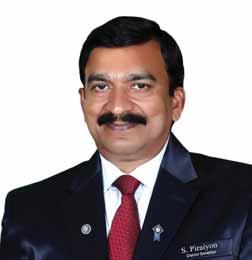
On membership, Piraiyon says that it has increased from 4,545 at the beginning of the year to 4,782 now and 25 per cent of the new members are women. Twenty new Rotaract clubs against a goal of 50; 22 RCCs against a goal of 60 and 12 Interact clubs have been added so far.
He aims to raise $400,000 for TRF.
The governor is a Rotarian since 1995 and his wife Geetha too is a Rotarian.
Dr Sayantan Gupta
Gynaecologist, RC Malda Central, D 3240
He joined Rotary in 2003 as charter president of the club. He wants to instill Rotary in Rotarians and has charted out various programmes to enhance their knowledge of Rotary. Sayantan Gupta is keen on saving the health of the rivers in the region and to “instill this consciousness in Rotarians” he has named the various district programmes after the rivers. “We are also working on projects such as expanding greenery on river banks, rallies and awareness programmes addressing pollution of rivers,” he says.
Gupta wants to increase membership by at least 300, with more focus on adding women members, particularly Rotarian spouses. “The club/district dues are waived for them. Now every month, we induct new spouse-Rotarians.” He is also encouraging dual membership for Rotaractors to join Rotary.
“My home club is sharing a greater part of the RI dues, apart from waiving the club/ district dues for such members,” he says. He is focusing on registering Rotaract clubs with RI and discouraging phantom clubs.
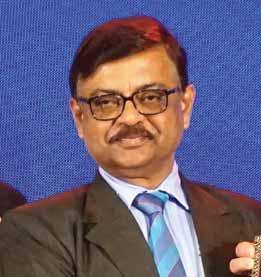
In Rotary, he enjoys most fellowship; “being a doctor, I could have rendered service to the community anywhere, but the bonding in Rotary is something I cherish.” Writing poetry, novels and drama in English and Bengali are his hobbies.
Gupta’s wife Puspita is also a charter member of the same club and he is hopeful that his younger daughter will also become a member.
Designed by N Krishnamurthy
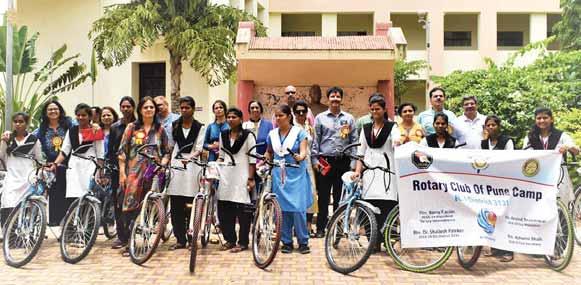
Every year, as part of its literacy and community development initiatives, RC Pune Camp, D 3131, donates refurbished and new cycles to girl students who earlier had to walk a long way to school from their homes. Since 2013, 500 cycles have been given.
In August this year, the club donated bicycles to 30 girls studying in the Sadguru Narayan Maharaj Madhyamik School at Bhiwadi village of Narayanpur taluka in Pune. “The girls used to travel 5 km to school. Although there is a
public transport it was erratic and the girls would be delayed reaching school. This resulted in a very high percentage of dropouts,” said Jaideep N Malaviya, the club’s director of Literacy and Community Projects.

Atraining workshop for young women to protect themselves from molesters and stalkers was conducted by Rotary Club of Poona, D 3131. A team of national-level professionals gave hands-on training to the participants.
“Such a need in unarmed combat was felt and hence our club launched this project with the theme Swayam suraksha he mein apnee raksha,” says Club
President Colonel Prem Anand. Once they were taught some basic martial arts, “the women will be able to handle offenders on their own without expecting any help from others in public spaces.”
The 90-minute course can be organised at any venue or an open ground in schools, colleges or residential societies. Every batch has 30 trainees to ensure individual guidance and the technique used is simple, adds Anand.


Ihave been officially a ‘working woman’ for nearly 40 years, meaning I have woken up in the morning and gone to ‘office’. Most days, my handbag would hold, among other necessities, a book. Still, after all these years, I can count on the fingers of my hand the number of times I read the book at work. Until my friend Tirna gave me as a present, The Return of the Social Butterfly by Moni Mohsin. “Hmm!” I thought to myself, looking at the cover. “Chick lit! Not my cup of tea!” But I smiled in thanks. Besides, Tirna has great taste in books.
Coming from one who claims to love books, I confess that that unspoken comment reeks of prejudice. A book is not just a book: it’s a miracle. You may bask more effortlessly in the glory of one miracle than that of another. Or, the miracle may not be meant for you at all, it may have
Sandhya Rao
Writing political satire that makes you roll over the floor laughing is not funny.
been misdirected. But at the heart of that miracle is a book, and book is never to be scoffed at, certainly not by one who loves books. That said...
The cover sporting the picture of a single, pink, stiletto-heeled sandal, displayed a quote from India Today: “Glamorous girly fiction evolves into Chanel-clad satire”. Get the picture? Clearly chick lit. Clearly not my cup of tea, never mind the confession. However, the reader in me overcame the misgivings so one day, during a break at work, I pulled the book out of my handbag, sat back in my swivel chair, and opened to the first page. I was intrigued by the opening lines, though not entirely spellbound. By page 14, I was dissolved in unstoppable giggles, unmindful of the looks I got from those walking past my workstation. Those unlucky enough to catch my eye as they went by found themselves captive as I read aloud to them from the book. I was

completely entangled in the nuances of the interminable difficulties of being a gossipy, well-heeled member of the Pakistani upper class, with servant problems and kitty parties and the ever-changing political landscape where no one knows whether they’re going or coming.
But, be warned. Finding something funny reading also has a lot to do with whether your funny bone has been tickled. That day, my funny bone was in overdrive. So, when I came to the following passage, there were tears running down my cheeks: “Apparently inside game is this: Nawaz wants to get rid of Musharraf who is obviously still President because despite of elections, his Presidential term doesn’t finish till August. So until then Mush is going to be our gullay ka haar.” Here, I must interject. My funny bone’s pretty dormant at the moment, but imagining Musharraf as
“gullay ka haar” (garland) brings on the giggles every time.
It doesn’t end there: “So Nawaz is thinking if he can bring back the Chief Justess, Iftikhar Chaudhry, who Mush threw out, then as soon as Chief Justess is back he will do tit for tit and he will immediately throw Musharraf out. Then Nawaz will urge the Chief Justess to get rid off the PPP government so that he, Nawaz, can become King of Pakistan again. But what’s wrong with that, Janoo (Janoo being the Butterfly’s other half)? I asked. I think so Nawaz has seen after his time in Saudi Arab that being king is sub say best. Na koi elections, na koi referendums, na koi Parliaments, na koi motions. Bus just you and you only.”
This is truly delicious. Hats off, Moni Mohsin. Not only for the delightful writing but for the sharp boldness of the political satire: the ‘diary’ entries that constitute the content of The Return of the Butterfly originally appeared in the Lahore-based newsweekly, The Friday Times. The use of the word ‘return’ in the book’s title implies

a precursor, so I went online and got hold of the first collection of a selection of Moni Mohsin’s columns, compiled as The Diary of a Social Butterfly.
In that one, the Butterfly introduces herself: “What? What do you mean, ‘who am I’? If you don’t know me than all I can say, baba, is that you must be some loser from outer space. Everyone knows me.
All of Lahore, all of Karachi, all of Isloo — oho, baba, Islamabad — half of Dubai, half of London, all of Khan Market, and all the nice-nice bearers at Imperial Hotel also… I live in Lahore. In a big, fat kothi with a big, fat garden in Gulberg, which is where all the khandani, khaata-peeta types live… I am very sophisty, smart and socialist. No ball, no party, no dinner, no coffee morning, no funeral, no GT — uff, now I have to explain GT to you also? Get Together, baba — is complete without me. Naturally, if you are going to be so socialist, you also need the right wardrope and the right looks. So I have to get my designer joras and visit my beauty therapists and my jewelers, vaghera, na. Just my selfless little way of supporting Pakistan ki economy. Unlike Janoo, who is a zinda laash, I am very gay.”

I love this Madam Butterfly who is so gay and who believes everyone is jay of her — arrey baba, jay for jealous, na — and who has her own take on the world around her. Like, for instance, from the third book, Tender Hooks: “Every day threats are coming to his (referring to her son, Kulchoo) school from beardo weirdos saying they will bomb it. Girls’ schools’ head teachers are being threated night and day that they’ll burn down their buildings and throw acid in the
A book is not just a book: it’s a miracle. It may not be meant for you at all, it may have been misdirected. But at the heart of that miracle is a book.
girls’ faces because their uniform is unIslamic. Just look at them! What can be more Islamic than a kameez that comes down to your ankles and a shulloo that has more cloth in it than a three-seater sofa? Cracks.”
Poor Butterfly. With all the beardo weirdos and suicide bombers looking funnily fat on top floating around, she can’t even go to her favourite five-star salon for her facials. She has to have someone home to ‘do’ her: “And also she has b.o. Honestly, what the Talibans have put us through! So when people say Americans are behind all this killing shilling, I say baba, I tau use Ester Louder products for my facial. And Ester Lauder, as everyone knows, is American. So why would Americans put axe in their own foot by causing all the kiiling in Pakistan so no one could even leave their houses any more to get Ester Louder facials, haan? In any case who is against facials? Is it Americans? No. Is it Indians? No. Is it Talibans? Yes. Yes. Yes. No one but the Talibans.” Perfect logic.
Yes. There’s no one quite like Moni Mohsin for hoysting us on our oven petals. And you better be on tender hooks because you could be on her hit the list. Then you will surely die laughing.
The columnist is a children’s writer and senior journalist.
Designed by Krishnapratheesh S
G Krishnan
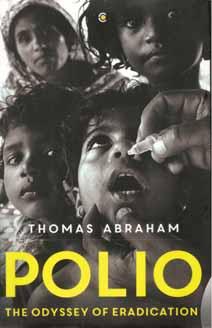
Westland Publications 252 pages; `699
After smallpox, how did polio capture the imagination of the world to become the largest mass immunisation programme in history?
Thomas Abraham brings decades of journalistic expertise to tell a gripping tale of geopolitics, illiteracy, and the role of big money in Polio, The Odyssey of Eradication.
By the 1980s, the United States had already made rapid progress in containing polio by injecting some 1.5 million children with inactivated
poliovirus vaccine developed by Jonas Salk. The efforts would be a waste if polio surfaced again as travellers re-imported it from countries where it was still present. For that, the world would have to become poliofree. But polio was not a top priority elsewhere. Each country had its own immunisation programme, based on local requirements. A determined coalition of American public and private organisations with deep pockets persuaded the world to launch a global campaign on a single disease instead.
In 1988, the Global Polio Eradication Initiative was born. This time, it would rely on the easy-to-use oral polio vaccine developed by Albert Sabin rather than on injection. The campaign would be implemented by the World Health Organisation, in collaboration with UNICEF and the US Centers for Disease Control. Rotary International and the Bill and Melinda Gates Foundation would provide the money power (along with boots on the ground to ensure total vaccination coverage).
Polio should be eradicated by the year 2000, the coalition declared. It did not foresee the sheer complexity of the campaign.
India had its own set of priorities but ultimately gave in. In 1992, thousands of Rotarians fanned out across the country with government health workers to put two drops of the
oral polio vaccine on the tongues of 90 million children, in the largest single mass immunisation in the world. In a country with poor and varying levels of public health services, the programme predictably got bogged down. In a tropical climate the vaccine did not behave as expected. Power was erratic and the vaccine was often not stored properly. Many health workers simply didn’t do the rounds, often vaccinating just one child instead of the required 100. They already had a multi-disease immunisation programme to take care of and this meant additional work. Multiple doses of the vaccine were required for it to be effective.

In Uttar Pradesh and Bihar, the abysmal health services and widespread illiteracy stymied progress. Word soon spread that the vaccine would sterilise children and was being targeted at Muslims. A huge backlash followed. It took years of persuasion by local leaders and politicians to convince people to vaccinate their children. Only in 2011 was India declared polio-free, one of the last countries in the world to achieve that target.
But the virus is still holding out in some countries. Last year, some 100 cases were reported in Pakistan, Afghanistan, Syria, Nigeria and
Congo. The original deadline of 2000 to eradicate polio has long gone, as have several revisions. Now, even the 2021 deadline appears to be unrealistic. Political turmoil and war, problems caused by the vaccine itself, and the exhaustion of public health workers who are forced to carry out vaccinations year after year, are all taking a toll on the programme. Clearly, the WHO underestimated the problems. Some $15 billion has been poured into the programme.
In Pakistan, the intractable war with the Taliban has derailed the programme. The Taliban has repeatedly shot dead dozens of
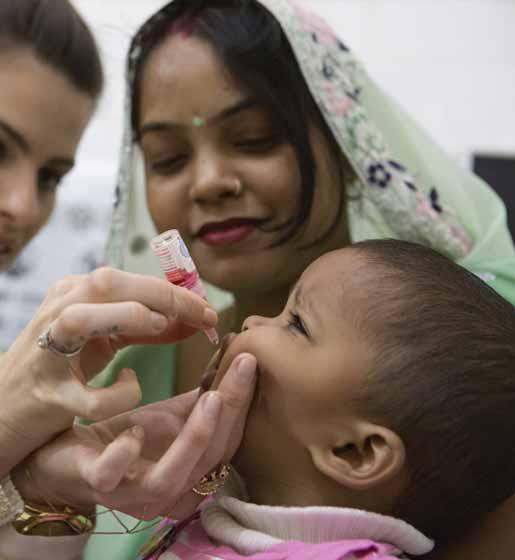
women vaccinators in Western Pakistan. Suspicion is widespread that the vaccinators are American agents. That suspicion arose after Osama bin Laden was tracked down and killed by the Navy Seals in Abbottabad with the help of a doctor who was involved in a vaccination programme. The Pakistani army cracked down on the Taliban and fleeing Pashtuns carried polio back into Afghanistan’s border. Migrant Pakistani workers have been blamed for introducing it in Syria.
Many health experts continue to say that instead of focussing on a broad spectrum of preventable diseases, countries are being forced to aggressively go after just one disease. Should polio be a priority for them when other diseases demand greater attention? Should they focus on polio just because the wealthy countries have eradicated it and face the threat of it being re-imported from places still affected by it?
“If there is a lesson from all this for future global health programmes,” the author writes, “it is that their task would be far easier if they were more responsive to the needs of the people that they were supposed to serve, rather than the well-meaning donors funding their projects.”
Abraham got interested in polio in 2009 while working as a communications officer with WHO in Geneva and was struck by the energy and determination of the polio team. As he immersed himself into the subject, he was struck by the complexities of the programme, its failures, achievements and ethical ambiguities and intrigued by why the eradication programme was missing so many deadlines and worked on this book over the next decade.
The writer is a journalist and an editorial trainer.

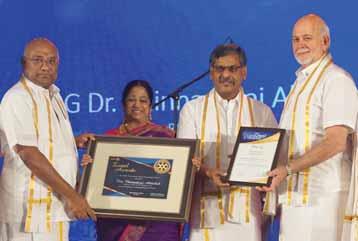


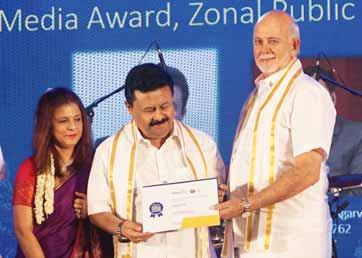
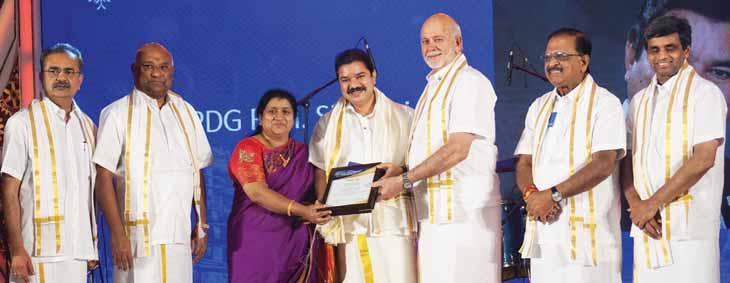



Kiran Zehra
The campus of Bright Minds
Vidyodaya School at Walajapet, in the suburbs of Chennai, resonated with conversation, laughter and cheer as D 3231, for the first time, hosted a zestful celebration exclusively for women Rotarians, Rotary Anns and Annets. The event brought to the fore their talent and showcased the power of Rotarian spouses in the district. Dubbed Magalir Mattum (Exclusive for women), this day-long event was packed with activities, fashion, food and fun.
“I have always been asked by the wives of club presidents and other Rotarians: Is there anything for us in Rotary? This was my little idea of getting the women involved,” says Sujatha Chandra Bob, spouse of DG Chandra Bob, and organiser of the event. In his address, DG Chandra Bob welcomed the spouses and thanked them for their support to their Rotarian husbands. “Thank you for understanding us and helping us do our best in serving society,” he said.
Sujata, a past president of Rotary E-Club of Chennai, wanted to “engage women in the district in fellowship and networking. When women get together and have meaningful conversation about Rotary, it induces interest in them to join Rotary and do wonders together.” Apart from it being a day-out for the women “this event brought to everyone’s notice the talent of those who
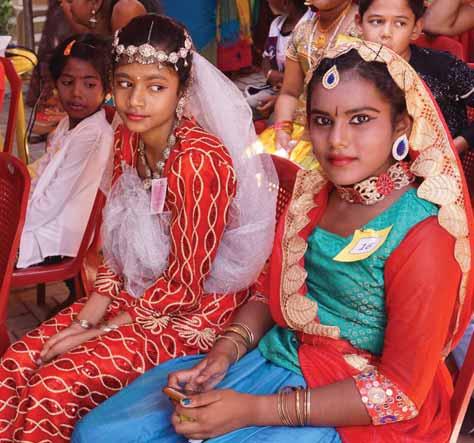
never had a platform to perform or showcase their talent,” she added.
Children transformed into their favourite cartoon character for the fancy dress competition, even as their mothers prompted from backstage the lines they had forgotten. “He hasn’t had much time to prepare,” quipped a mother backstage. From applying make-up and dressing up their children who were participating in various events, to cheering them, Anns and women Rotarians were seen
promptly reporting at the competition desk and completing their task in time. “Which means we are already blessed with time management and multi-tasking skills. Imagine if we could bring these skills to Rotary. Most women do not even know they have such skills. This event will help them understand that,” said Event Chair Nandhini Nirmal.
Women in colourful pattu (silk) saris weaved through the crowd visiting the many stalls set up in the


school’s playground. They thronged the clothing, accessories and mehndi stalls, while the Annets buzzed around the food and games stalls. The earthenware and home accessories stalls saw a good number of footfalls. “All the stalls were set up by Rotarians or their spouse to promote their business and help them network,” said Sujatha.
Facial at `50
One of the stalls displayed cosmetic products for sale and beside it was a facial counter at `50. Uma Mageshwari, who was in charge, lured the crowd by frequently announcing “Facial at `50.” When asked if she was doing good business, she laughed and replied, “Initially people were hesitant. But after seeing a woman getting a facial done, many more lined up.” By the evening she had done over 60 facials, while a mehndi stall closed after beautifying 120 hands.
On stage, scenes shifted from singing to dancing competitions, with the audience frequently breaking into a dance. The participants posed for selfies, which quickly went online with the #magalirmattum. The vegetable carving stall had attractive models of a skeleton with capsicum ribs, a pumpkin basket full of carrot

flowers, dolls made from onions and cucumber, an apple swan and other such elaborate fruit and vegetable carvings done by participants.

Women Rotarians must meet Rotary spouses at a personal level, talk to them about the goodness of Rotary and encourage them to become Rotarians.
Sujatha Chandra Bob
Another off-stage event that appealed to everyone was the Kuthuvilakku (bronze lamp) decoration. In Hindu culture, the kuthuvilakku is of religious significance and part of daily worship. “So, this competition has given the participants and spectators new ideas to try at home,” said Past President Usha Ajith Prasad of RC Tambaram Central, D 3231. From elaborate settings to a simple Radha and Krishna, the lamps were decorated under a limited time frame by the participants.
Lunch at the carnival was an elaborate affair too, even though
only vegetarian. “Because it is the holy Tamil month of Puratasi many of us refrain from eating non-veg food. But there is a variety to choose from at the vegetarian buffet,” Sujatha added. Post lunch, women walked the ramp and danced together. Winners were felicitated and as a parting tradition, they were given bangles and kumkum. “If we want women to join Rotary, we have to offer them a friend. This is only possible when women in Rotary meet Rotary spouses at a personal level and talk to them about the goodness of Rotary, and that was the goal of Magalir Mattum,” said Sujatha, who hopes that this will be an annual affair where “women can meet, talk, enjoy and eventually join Rotary.”
Pictures by Kiran Zehra
It was, you’d think, a very serious moment. Two of the most venerated icons in the world — The Dalai Lama and Archbishop Desmond Tutu, were all set to walk staidly together onstage to give a talk on how compassion, peace, love and empathy would save our world.
As they took a few steps, the Dalai Lama, suddenly seized by a playful mood, pretended to strangle his fellow-speaker. “Hey!” protested the Archbishop, “The cameras are on us, act like a holy man!”
It’s a scene I keep re-playing in my mind and it never fails to bring a smile to my lips, which then spreads to my entire being.
No hang-ups. What is the secret behind these two great mens’ mirth and mischief? First of all, they’d laugh heartily at being described as ‘greats’. The Archbishop never claimed to be chief of priests and the Dalai Lama sees himself as a simple lama. I flush with embarrassment when I think of the time I described myself as a ‘senior writer’! Uff! I feel so much more light-hearted, so free after I became a simple writer. It is important to observe, absorb and emulate the attitude and behaviour of the wonderful luminaries amongst us.
For, it’s a fact — hang-ups do weigh us down because they are a load on our naturally free spirit. That is how our anxiety levels rise. And we begin to live ‘lives of quiet desperation.’ The mark of an anxious person is nervous body-language, withdrawing
into a self-cocoon or, alternately, overreacting aggressively. The pulse beats at 95-plus per minute (78–84 is considered normal), the breathing is quick and shallow.
this guy who, every time he shops for groceries, buys extra bags of rice and dal and gives them to beggars at traffic lights. He does it because it feels right. Just reading about him brings sweetness in you, doesn’t it?
y
align with our natural m. Sit closed. ong
our stomach rise as inhale l as exhale. Calm mind ell-intentioned
You

Explain life to your mind. The mind listens. Care for it. Check in every now and then to see if it is okay. If it’s upset, explain to it the other person’s perspective. As goes an ancient Amish proverb, “Instead of putting
ually your rate from 0 f s l ow, consc i ous b reat hi n g to come, if you feel a g in the back of your head, ns a g ng g to a changge from and ance It is s a of sweetness.
Breathe away the buzz. Slow, conscious breathing is essential to dissipate the buzz and blur of anxiety and re-align with our natural peaceful rhythm. Sit comfortably, eyes closed. Take long breaths through your nose; exhale long breaths from your mouth. Feel your stomach rise as you inhale and fall as you exhale. Calm your mind with well-intentioned thoughts: May all be happy, healthy, peaceful. You can actually slow your pulse rate from 95 to 80 beats a minute after 10 minutes of slow, conscious breathing. In the days to come, if you feel a tingling in the back of your head, it means you are getting into a calming pattern. Your brain is adjusting to a change from fearful and angry reactivity to one of ease and joyful acceptance. It is literally a tingle of sweetness.
And sweetness is hugely preferable to stress any day, isn’t it? Stress increases anxiety, so please don’t seek it. Distance yourself from negativity, drama, dialogues. Be kind, not hard on yourself and others. If something feels wrong, don’t do it. If something feels right, do it. There’s
d sweetness is able to stress any ? anxo don’t seek it. ce yourse lf f rom vi ty, d rama, d iaBe kind, not hard rself and others. If hing ght, do it. There’s


others in their place, put yourself in their place.” If your mind is angry, explain to it that life is big enough to accommodate all kinds of events and emotions to play out. Give it love, give it understanding, give it words uttered by the greats so that it can fly on their wings until it learns to fly on its own. Nurture the mind because it manages your relationships. It can make the dismal abyss of differences glow with the sweet radiance of acceptance.
In this spirit of acceptance tell your mind repeatedly to suspend judgment. Judgment delayed is anxiety denied as this little parable teaches: A child was holding two apples in her hands. Her mother walked in with a soft tread and asked her with a fond smile, “Hello,
my sweetie, may your Mom have one apple, please?”
The little girl looked up at her, then at the apples, then quickly bit into one
apple and almost as quickly bit into the second apple as well…
The mother’s smile froze. She tried hard not to feel let down. And the girl handed over one bitten apple saying, “Here you are, Mommy. This is the sweeter one.”
when things have turned out just fine. That’s how we open our minds and hearts to trust.

e x p er i ences. Anx i et y h as no e lb ow room when, with the ments, we also people in our life, the times
That one moment, if held in suspended judgment, has immense potential for peace, acceptance and surprise. For, anxiety also arises from an acute lack of trust. Harassed is he who believes there’s always a gun to his head. Happy is she who believes there’s always a flute at her lips. Every one of us has been pleasantly surprised not once, but several times, the way people or situations have come through. Now, all we have to do is: remain true to our experiences. Anxiety has no elbow room when, along with the disappointments, we also constantly acknowledge the reliable
Sifting four conditions. Anxiety is a mix of four inner conditionings that make us think and act the way we do. These are:
Self-pre-occupation: being concerned almost solely with one’s own beliefs and opinions. To break through this conditioning, we explore new ways of thinking, keep our mind open to other viewpoints, by saying, “There’s always something new to learn.”
Anger stems from resisting the flow of life. This can be overcome by deciding to co-operate with people and flow with maximum number of situations.


Greed comes from lack of self-control, like wanting more and unable to stop yourself at the sight of a chocolate cake. Here, self-mastery can be developed by attaching our sense of values — I value my health, so I do not touch that cake. Fear flows from feeling powerless in a situation, in life. Here, the need is to master the situation by exercising responsibility — consulting experts, designing creative ways to ease and deal with the issue — and reclaiming the sense of power.
Finally, declare and make every day a non-anxiety day. Walk in the park knowing that each step brings peace and stability. Drink your tea in freedom and joy by appreciating every sip and marveling at its easy accessibility. Above all, don’t take life so seriously. Even the Dalai Lama doesn’t. And, he is a holy man!

The writers are authors of Fitness for Life and Simply Spiritual – You Are Naturally Divine and teachers of the Fitness for Life programme.
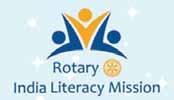
PRID and RILM Chairman
Shekhar Mehta headed a panel discussion organised by the National Literacy Mission Authority (NLMA) of the HRD Ministry’s Department of School Education and Literacy, to commemorate the International Literacy Day at the Pravasi Bharatiya Kendra, Delhi. HRD Minister Prakash Javadekar was the chief guest and it was attended by Upendra Kushwaha, the HRD Minister for State, Secretary ( Department of School Education and Literacy) Rina Ray; Joint Secretary, (AE) and Director General - NLMA Sachin Sinha and Al Amin Yusuf, Advisor for Communication for South Asia, UNESCO Office, Delhi.
Mehta, talking about the high illiteracy rate, suggested that Rotary can support the government in addressing this issue and highlighted Rotary’s success in eradicating Polio. Rotary clubs have already initiated the pilot project for improving literacy, he said and suggested that for successful implementation of the literacy scheme, it should be launched by the Prime Minister with wide publicity and public attention. Budget is also one of the deciding factors for the success of the literacy scheme. Sufficient funds should be allocated for free distribution of primers to student-volunteers to counter adult illiteracy, he said. PDG Ranjan Dhingra and Rtn Ajay Kumar Singh also spoke on strategies adopted by Rotary to improve Adult literacy.
Many Rotary and Inner Wheel clubs have enthusiastically identified and

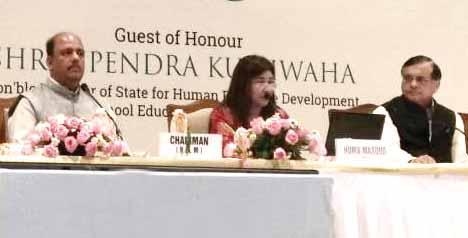
recognised efficient government teachers with Nation Builder Awards (NBA).
As of Oct 11, of the 31,708 teachers evaluated nationwide, 6,709 teachers have been awarded with the Award. The numbers are still ticking as the frenzy has caught on with more clubs. The award recognises the contribution of teachers in building this nation and the evaluation process provides RILM valuable information for its Teacher training vertical. This year the entire process of NBA was done online through the RILM website.
The NBA model was lauded by the Karnataka government; the education department has evinced interest to associate itself in the programme for assessment of government school teachers in the State.
RC Kalimpong, D 3240, and RC Muzzafarpur, D 3250, presented Rotary Nation Builder Award for 25 government school teachers. RC Greenland Silchar, D 3240, gave NBA certificates for 32 teachers and RC
Bokaro Midtown, D 3250, honoured 17 teachers with the award. Rotary Clubs of Bombay North West Malad and Jamshedpur West also recognised teachers in their districts.
The Inner Wheel Clubs of Deonar, Tiruchi Malaikottai, Gaya, Balrampur and Bombay Kandivli also felicitated teachers with NBA certificates.
Kolhapur club trains 10,000 teachers RC Kolhapur Sunrise, D 3170, signed an MoU with the Zilla Parishad of Kolhapur, to train 10,000 government school teachers, in the presence of PDG Anand Kulkarni; CEO of Zilla Parishad Kolhapur Kunal Khemnar; DLCC Prasanna Deshingkar and Member of Parliament Dhananjay Mahadik.
The training was conducted with the help of the District Institute of Educational Continuous Professional Development (DIECPD) to enhance the skills of teachers in spoken English and using technology in teaching. So far RILM has trained 32,000 teachers and felicitated 14,000 teachers under this programme. Designed by L Gunasekaran
Innovation and technical expertise of Rotarians came to the fore with RC Bagha Purana, D 3090, commissioning a 300 KV mobile EB transformer fixed on a trolley to handle emergency situations over a radius of 15–20 km. The service will reach out to at least 25–30 villages around this tehsil in Moga district of Punjab.
While the trolley was assembled in the town, a 28-member Rotary team, with technical inputs from the Power Grid Corporation, designed the portable transformer “that has been pressed into service from Nov 4 and has so far attended five problems,” says Vimal
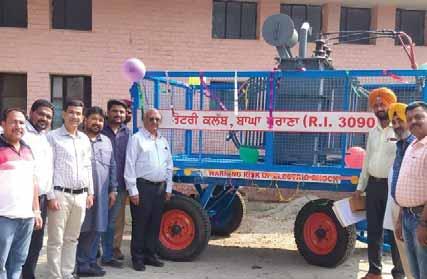
Rotarians with the Transformer on Wheels at a site.
Garg, Club President. The trolley was bought at a cost of `70,000, while the portable EB device cost the Rotarians around `2.7 lakh.
“It will be a boon to the villagers as power cuts and voltage fluctuations
Itare common due to faulty transformers. The transformer trolley will be stationed at the site of power breakdown till the problem is fixed by the corporation linemen,” explained Garg. The
is understood that scammers have created multiple communication and social media accounts that impersonate RI President Barry Rassin, RIPE Mark Maloney, General Secretary John Hewko and other Rotary leaders. The communication accounts include/involve email, WhatsApp and Viber. The social media accounts have been on LinkedIn, Twitter and Facebook. These are not authentic Rotary communications. They are phishing and spoofing attempts to obtain money and personal information, convince Rotarians to send funds to support alleged Rotary causes. Rotary monitors and responds
to these attempts to keep member, programme participant, and staff data safe.
Rotary members should continue to exercise caution:
Disregard suspicious messages that offers/requests money, or asks for your personal information.
Avoid opening attachments or following links in suspicious messages. Pay close attention to details of the email address and signature block to verify the sender.
Please forward such suspicious messages to fraudreport@rotary.org and then delete it immediately.
© Rotary.org
vehicle has been playing a supporting role to the Power Grid officials by reaching the breakdown spot in time and ensure uninterrupted supply till the faulty transformer is rectified.
new Global WinS Chair
Chair of The Rotary Foundation
Ron Burton has appointed PRID
P T Prabhakar as Chair of the Water and Sanitation in Schools – Target Challenge Committee. The term of this appointment is two years, till June 2020. He succeeds RIPN Sushil Gupta who served as the first Chair of this committee.
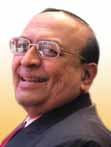
Three years ago, in a fit of beer induced silliness, I told some friends about the great virtues of those who write in newspapers, especially journalists. Irritated by my smug tone, a friend challenged me to write a novel and/or short stories. Her dismissive and derisive tone annoyed me. So, like a fool, I decided to do both, that is, write a novel as well as short stories. The novel has just been published and, if only four of the 20 short stories I have written have been published so far, it is because there is no market for them. Newspapers and magazines in India no longer publish short stories, at least not in English.
It has been an interesting experience. I have discovered that if you plod on at the rate of 1,000 words a day, it is not that hard to produce a novel which, truth to tell, is nothing more than a bunch of fabrications told around a kernel of truth. Ditto for short stories. The publisher who had accepted the
I chose to write a 250-page novel because I didn’t want to forget on page 300 what I had written about on page 50.
novel made a three-word suggestion for improvement: Add 20,000 words. Then a few weeks later came one more suggestion, in six words this time: capture the sense of the times. The book is about Delhi in the latter half of the 1970s. As to the short stories, the Editor was very young and gave me a lot of earnest advice. I ignored most of it.
As I trudged along, it became evident to me that both present difficulties of different sorts. The hardest part comes at the very start: Deciding the length. You can write one 800-page novel, or two novels of 400 pages each, or three each of 250 pages. Likewise, you can write a 10,000-word short story or a 5,000-word one, or one of 1,000 words. Or, if you need to, an even shorter one. I chose 250 pages for the novel because I didn’t want to forget on page 300 what I had written about on page 50. It happens as you age. For the short stories I decided on 1,000 words which has an interesting and illustrious pedigree. John O’Hara wrote hundreds of them for the Saturday Evening Post. I had always wanted to emulate him, and, even if I say so, I think have succeeded just as well in terms of quality.
When the contracts arrived, I found they covered all possible contingencies. These ranged from the publisher acquiring the rights to sequels, movie rights, TV rights, radio rights, and, lest we forget, Braille. There were

some other options they took as well. Forty years ago, when I was working in a publishing house, I used to treat authors in exactly the same way. There was special joy in making them forgo royalties, which didn’t amount to much. But still, bullying has its own reward. Now I was at the receiving end. But seriously, how long or short should a novel and a short story be? Who decides: The publisher, the author or, god forbid, the reader? Fat novels are hard to read because of their weight. Also with other competing sources of entertainment, they are hard to finish reading. A long short story doesn’t quite work. The reader knows it is a short story and wonders why it is going on and on. Many writers join together what are really a series of short stories and call it a novel. I call it the ‘one damn thing after another’ format.
But having been there and done that, I can offer some advice in case you want to write a short story or a novel. Here’s what I think should be done. But remember, you need an iron will to execute the plan. So, first, ignore the publishers. Second, make your novel like a limited overs match or a flight in the way it is laid out — a good start of 50 pages, cruise in the middle and a good ending of 50 pages. And third, if it is a short story, always end it in a surprise. That’s the hard part. But try it. It’s good fun.
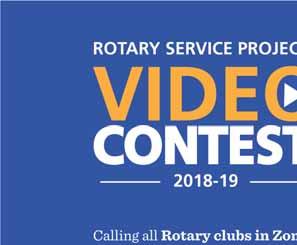
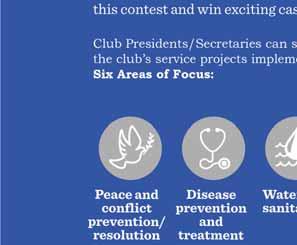
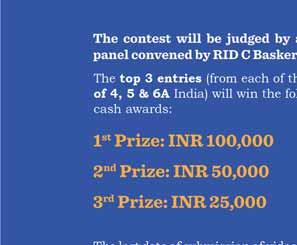

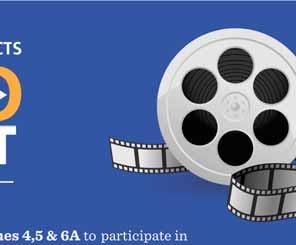

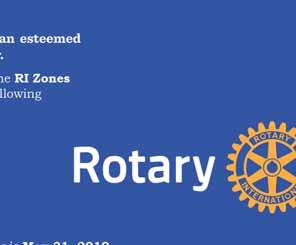



Regn. No. TN/CCN/360/2018-2020
Licensed to post WPP No.TN/PMG(CCR)/WPP-431/2018-2020
Total number of pages in this monthly issue, including cover, 84. Price: `35
Registered with Registrar of News Papers for India 3880/57 Rotary News Published on 1st of every month
